
Blogs
Insights and Advice Legal Blog

February 5, 2025
What Happens When You Are Arrested for Murder?
Imagine waking up one morning to find yourself arrested for something as grave as murder. The weight of that reality presses against you, and suddenly everything you thought you understood about life—about yourself—feels distant, as though you’re watching your own story unfold from some detached vantage point.
In Wisconsin, if you find yourself facing murder charges, the path ahead is not one you can walk alone. It’s a cold and complicated system, where decisions are made swiftly, and every step you take can either bring you closer to freedom or to a fate that might forever alter your life. Let’s take a moment to explore what happens when the unthinkable becomes your reality.
1) Arrest & Booking
When law enforcement arrests you for murder in Wisconsin, they will take you into custody and transport you to jail for booking. This process involves several key steps:
Identification & Processing: Officers will record your personal information, including your full name, date of birth, and any distinguishing features. They will also take fingerprints and a mugshot, which becomes part of your criminal record.
Search & Property Confiscation: Law enforcement will conduct a full-body search to check for weapons, contraband, or evidence. Any personal belongings, including your phone, wallet, and jewelry, will be confiscated and logged.
Interrogation & Your Rights: Officers may attempt to question you about the crime, but you are not legally required to answer. Under the Fifth Amendment, you have the right to remain silent and avoid self-incrimination. You should clearly state that you want an attorney before answering any questions. If you cannot afford one, the court will appoint a public defender to represent you.
Holding & Initial Detention: After processing, you will be placed in a holding cell until your initial court appearance. Depending on the circumstances, you may be kept in a county jail or a detention facility while awaiting further legal proceedings.
2) Initial Appearance & Bail Hearing
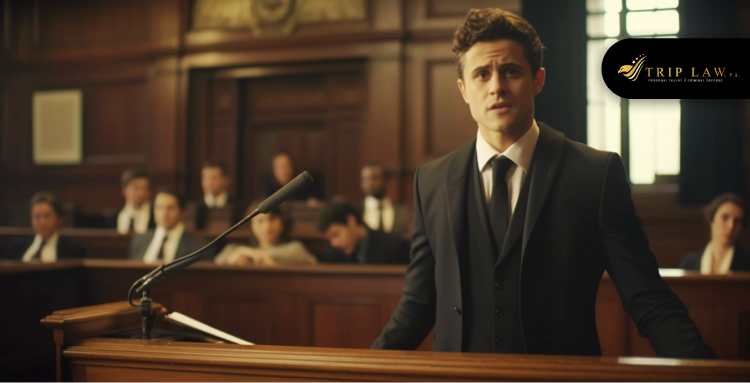
Within 48 hours of your arrest, you will appear before a Wisconsin judge for your initial appearance. This is your first formal court proceeding, where the judge ensures you understand the charges against you and determines whether you will be granted bail or remain in custody.
Judge’s Role & Reading of Charges: The judge will formally state the criminal charges filed against you, including the specific degree of homicide you are accused of. You are not required to enter a plea at this stage, but this hearing sets the stage for the legal process ahead.
Bail Considerations & Denial for Murder Cases: The judge will decide whether to grant bail, which allows for release while awaiting trial. However, in murder cases, bail is often denied due to the severity of the charge and concerns about flight risk or public safety. If bail is considered, it will likely be set at a high amount, and conditions such as house arrest or electronic monitoring may apply.
Right to Legal Representation: If you do not have an attorney, the judge will ask if you need one. If you cannot afford a lawyer, the court will appoint a public defender to represent you. This step is critical, as having legal representation early can shape your defense strategy moving forward.
If bail is denied, you will remain in custody until your next court appearance, making it even more important to work closely with your attorney to prepare for the upcoming legal proceedings.
3) Charging & Arraignment
After your initial appearance, the District Attorney (DA) reviews the evidence to determine the formal charges against you. The charge the DA pursues will significantly impact the penalties you face.
(I) How the DA Decides Charges
The DA examines police reports, witness statements, forensic evidence, and motives to decide whether to file a formal homicide charge. If the evidence is weak, the DA may reduce the charge or even drop it. If the case is strong, they will file one of Wisconsin’s homicide charges, such as:
First-Degree Intentional Homicide: The most serious charge, requiring proof that the killing was premeditated or intentional (Class A felony, life imprisonment).
Second-degree Intentional Homicide: Similar to first-degree but with mitigating circumstances, such as provocation (Class B felony, up to 60 years in prison).
First-Degree Reckless Homicide: Charged when a person causes death through reckless conduct that shows utter disregard for life (Class B felony, up to 60 years in prison).
Felony Murder: Applies when a death occurs during the commission of certain felonies, such as robbery (sentence based on the underlying felony plus up to 15 years).
(II) Arraignment & Entering a Plea
Once the DA files a charge, you will attend an arraignment hearing, where the judge will read the formal charges against you. You will then be required to enter a plea:
Guilty – You admit to the charges, and the case moves directly to sentencing.
Not Guilty – You deny the charges, and the case proceeds to pretrial motions and trial.
No Contest – You do not admit guilt but accept the conviction (often used in plea deals).
If you plead not guilty, your attorney will begin building your defense, negotiating with the prosecution, and exploring legal strategies to fight the charges.
4) Pretrial Process

After arraignment, your case enters the pretrial phase, where your defense attorney plays a crucial role in investigating the charges, challenging the prosecution’s evidence, and exploring legal strategies to strengthen your defense.
Defense Attorney’s Role: Your attorney will identify weaknesses in the prosecution’s case and build a defense strategy. This may include challenging witness statements, questioning forensic evidence, or establishing an alibi.
Discovery Process: Both sides exchange evidence in a process called discovery. Your attorney will review police reports, witness testimony, forensic results, and surveillance footage to determine if there are inconsistencies or constitutional violations in the investigation. The prosecution must turn over any exculpatory evidence—information that could prove your innocence.
Filing Motions to Strengthen Your Defense: Your attorney may file legal motions to challenge the prosecution’s case, such as:
Motion to Suppress Evidence: If evidence was obtained illegally (e.g., through an unlawful search or improper interrogation), your lawyer can ask the judge to exclude it from trial.
Motion to Dismiss Charges: If the prosecution lacks sufficient evidence, your attorney can push to have the charges dropped before trial.
Motion to Change Venue: If pretrial publicity could prevent a fair trial, your attorney may request to move the case to a different county.
Plea Bargaining: In some cases, the prosecution may offer a plea deal to avoid trial. This typically involves pleading guilty to a lesser charge in exchange for a reduced sentence. Your attorney will weigh the pros and cons and advise whether accepting a deal is in your best interest.
5) Trial Process
If your case goes to trial, both the prosecution and defense will present their arguments before a judge and jury. Here’s the breakdown of the trial process, which follows a structured format under Wisconsin law:
(I) Jury Selection & Trial Preparation
Before the trial begins, your attorney and the prosecution will go through jury selection (voir dire). Both sides will question potential jurors to ensure they can be fair and impartial. Any juror with bias or a conflict of interest can be removed. Meanwhile, your defense team will finalize strategy, prepare witnesses, and anticipate the prosecution’s arguments.
(II) Courtroom Proceedings
The trial itself follows a clear structure:
Opening Statements: Both the prosecution and defense present their version of events, outlining what they intend to prove.
Presentation of Evidence: The prosecution goes first, presenting physical evidence, expert testimony, and witness statements to build their case. Your attorney will have the opportunity to cross-examine witnesses and challenge evidence.
Defense Case: Your attorney may present their own evidence, witnesses, or expert testimony to counter the prosecution’s arguments. In some cases, you may be advised to testify in your own defense, though this is not required.
(III) Closing Arguments & Jury Deliberation
After both sides have presented their case, they give closing arguments—final attempts to persuade the jury. The judge will then instruct the jury on the legal standards they must follow before sending them to deliberate.
(IV) Verdict Requirements
In Wisconsin, a criminal conviction requires a unanimous jury decision. If all jurors agree on guilt, the judge will move to sentencing. If they unanimously found not guilty, you are acquitted and free to go. If the jury cannot agree, the judge may declare a mistrial, potentially leading to a retrial.
However, at trial, the prosecution must prove your guilt beyond a reasonable doubt. A strong defense can challenge flawed evidence, unreliable testimony, or legal errors, making this stage one of the most critical moments in your case.
6) Sentencing (If Convicted)

If you are convicted of homicide in Wisconsin, the judge will determine your sentence based on state sentencing laws, the severity of the offense, and any aggravating or mitigating factors.
(I) How Wisconsin’s Homicide Laws Determine Sentencing
Wisconsin classifies homicide offenses based on intent, recklessness, and circumstances. The judge considers factors such as premeditation, prior criminal history, and the impact on victims when deciding your sentence. Unlike some states, Wisconsin does not have the death penalty, so the harshest punishment is life imprisonment, with or without the possibility of parole. If sentenced to life, your eligibility for parole depends on the specific homicide charge and judicial discretion at sentencing.
(II) Life Imprisonment for First-Degree Intentional Homicide
If convicted of first-degree intentional homicide (Class A felony), the sentence is mandatory life in prison. However, the judge may allow for parole eligibility after a set number of years, or they may rule that you will spend the rest of your life behind bars without the possibility of release.
(III) Sentencing for Other Homicide Charges
If convicted of a lesser homicide charge, your sentence will vary:
Second-degree Intentional Homicide (Class B Felony): Up to 60 years in prison
First-Degree Reckless Homicide (Class B Felony): Up to 60 years in prison
Second-Degree Reckless Homicide (Class D Felony): Up to 25 years in prison and fines up to $100,000
Felony Murder: The penalties for felony murder are serious and can also include life imprisonment. The sentence depends on the underlying felony plus up to 15 extra years.
7) Appeals & Post-Conviction Options
A conviction doesn’t always mean the case is over. If legal errors occurred during your trial, you may have the right to file an appeal or seek post-conviction relief.
(I) Filing an Appeal for Trial Errors
If your attorney believes your trial was unfair due to legal mistakes, they can file an appeal with the Wisconsin Court of Appeals. Common appeal grounds include:
Errors in jury instructions that misrepresented the law.
Incorrect rulings on evidence, such as admitting illegally obtained statements.
Ineffective assistance of counsel, if your defense attorney failed to provide competent representation.
Prosecutorial misconduct, such as improper arguments or withholding exculpatory evidence.
Remember, If the appellate court finds that a legal error affected the outcome, they may overturn the conviction, order a new trial, or modify the sentence.
(II) Possibility of Sentence Modifications
Even if an appeal isn’t successful, you may still seek a sentence modification in specific cases. For example:
New evidence emerges that could impact sentencing
Changes in law that retroactively reduce penalties
Compelling personal circumstances, such as deteriorating health or rehabilitation efforts
Wisconsin Murder Arrest? Trust Milwaukee Legal Pros for Guidance
A murder arrest is life-changing, and every decision you make from the moment you're taken into custody can impact your future. Without experienced legal representation, you risk facing the full force of the legal system alone.
Protecting Your Rights from Day One: From the initial arrest to trial, we ensure your constitutional rights are upheld, preventing unlawful interrogations and procedural missteps that could harm your case.
Strategic Defense Planning: Every murder case is unique. We analyze the evidence, challenge weaknesses in the prosecution’s case, and explore all possible defense strategies to protect your freedom.
Bail and Pretrial Advocacy: Securing pretrial release in a murder case is difficult but not impossible. We’ll fight for fair bail terms and work tirelessly to build a strong defense from the start, preventing additional future consequences.
Stronger Courtroom Representation: Whether negotiating a plea deal or taking your case to trial, we advocate fiercely on your behalf, ensuring you have the best possible defense against the charges.
Post-Conviction Appeals and Sentence Modifications: If you've been convicted, our work isn’t over. We explore every legal avenue for appeals, sentencing adjustments, or post-conviction relief to fight for your future.
Don’t let a murder charge define your life or shape your future. Let Milwaukee Legal Pros fight for your rights with relentless advocacy and strategic defense. Contact us today for the legal support you need.

January 26, 2025
What to Expect After Theft by Taking Felony Conviction
Life has a way of surprising us with its harsh truths, often at the most inconvenient times. Imagine, for a moment, finding yourself on the wrong side of the law, convicted of felony theft. It's a sobering reality that many don't see coming. The consequences that follow are as real as the very breath we take, and they’ll alter the course of your life in ways you may not expect. Whether it’s the weight of a prison sentence or the quiet effects on your future, the road ahead can seem daunting.
However, it’s important to understand what comes next, so you can navigate this challenging chapter with clarity, rather than fear. Let’s take a closer look at what you can expect after a theft conviction and how you might make sense of it all.
1. What is Theft by Taking Felony Conviction
At its core, theft by taking in Wisconsin is an act that strips someone of their rightful ownership. Under Wisconsin Statutes Section 943.20, theft is defined as intentionally taking or retaining possession of someone else’s property without consent and with the intent to permanently deprive the owner of it. This act demonstrates not just a disregard for personal property but also a breach of trust that society holds dear.
To understand theft by taking it fully, it’s crucial to differentiate it from other theft-related offenses. For example:
Theft by Fraud: This occurs when a person deceives someone to gain possession of their property. Unlike theft by taking, fraud relies on manipulation rather than direct action.
Theft by Concealment: This involves intentionally hiding merchandise to avoid paying for it, often associated with retail theft or shoplifting.
Theft by Embezzlement: This applies when someone lawfully entrusted with funds or property unlawfully converts them for personal use.
2. Felony Theft Classification: What are the Consequences?

In Wisconsin, the line between misdemeanor and felony theft isn’t arbitrary; it’s drawn by the value of the property taken. The more valuable the property, the more severe the charge.
Misdemeanor vs. Felony Theft
Misdemeanor theft typically involves property valued at less than $2,500. It's a charge that, while still serious, often carries lesser penalties. This could mean a fine, a short stint in jail, or probation. However, when the value of the stolen property exceeds a certain threshold, the offense escalates to felony theft, which entails far greater consequences.
Felony Classes in Wisconsin
Wisconsin categorizes felony theft offenses into specific classes, each carrying its own range of penalties. Here’s a breakdown of the major classes:
Class I Felony: This is the least severe of the felony classifications but still a serious charge. A theft of property valued between $2,500 and $5,000 can result in up to 3.5 years of imprisonment (1.5 years in prison plus up to 2 years of extended supervision) and fines reaching $10,000.
Class H Felony: If the value of the stolen property falls between $5,000 and $10,000, the charge becomes a Class H Felony, which carries up to 6 years of imprisonment (3 years of confinement and 3 years of supervision) and the possibility of $10,000 in fines.
Class G Felony: For theft of property valued at over $10,000, the charge jumps to a Class G Felony, which can result in up to 10 years in prison (5 years in confinement plus 5 years of supervision), along with fines up to $25,000.
Class F Felony: The most severe of these classifications involves theft of property valued over $100,000. A Class F Felony carries up to 12.5 years in prison (7.5 years in confinement plus 5 years of supervision) and fines as high as $25,000.
3. Collateral Consequences of a Felony Conviction: Employment, Rights, and Stigma
While the legal penalties are immediate and clear, the collateral consequences often linger long after the sentence is served, affecting one’s ability to rebuild and move forward. These consequences, though less visible, are no less impactful.
Employment Challenges
In Wisconsin, like in many states, employers often conduct background checks to assess the character and history of potential employees. A felony conviction in Wisconsin can significantly limit job prospects, especially in fields that require high levels of trust or security clearance.
Professional licenses—whether in healthcare, law, finance, or other fields—are often withheld from individuals with felony convictions. This can be devastating for those whose careers depend on maintaining these certifications.
Civil Rights Restrictions
A felony conviction also leads to certain civil rights restrictions, which can drastically alter one’s relationship with society. In Wisconsin, felons lose the right to vote until they have fully completed their sentence, including any parole or probation. For many, this is a disheartening consequence, as it removes their ability to participate in civic duties during a critical time in their life.
Additionally, felons face firearm ownership prohibitions. Under both Wisconsin and federal law, individuals convicted of felony theft are barred from purchasing or possessing firearms. This restriction can impact not only personal safety but also one’s ability to engage in activities such as hunting or owning firearms for protection.
Social Stigma
Beyond the legal restrictions, perhaps the most pervasive consequence of a felony conviction is the social stigma it carries. A felony conviction doesn’t just affect how the law sees you—it affects how your community, friends, and family do as well. The weight of being labeled a “felon” often comes with a heavy dose of societal judgment, which can strain personal relationships and diminish one’s standing in the community.
4. Let Milwaukee Legal Pros Help You Build a Defense That Stands Strong
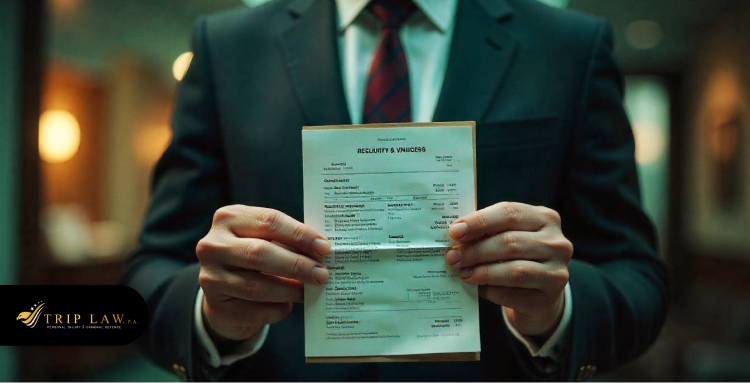
When facing a felony theft charge in Wisconsin, it’s essential to understand that the outcome of your case is not determined solely by the facts at hand—it is shaped by the defense strategies available and the strength of your legal representation. These strategies aim not only to weaken the prosecution's case but also to raise reasonable doubt in the minds of the jury or judge.
Claim of Ownership
One of the most straightforward defenses in a theft case is the claim of ownership. If the defendant can prove that the property in question rightfully belonged to them, the charge of theft evaporates. This defense is often used when there is confusion about the property’s rightful owner or when the defendant took property mistakenly or without malicious intent. Demonstrating ownership can be as simple as presenting receipts, testimony, or any other evidence that proves the individual’s right to the property.Lack of Intent
Theft, particularly theft by taking, requires the intention to permanently deprive the rightful owner of their property. Without this intent, the act may not constitute theft under the law. For example, if the defendant took an item by mistake, or if they intended only to borrow it, we could argue that the necessary mental state for theft was not present. Lack of intent is often used as a defense in cases involving misunderstandings, miscommunications, or accidental actions.Entrapment
Entrapment occurs when law enforcement officials coerce or induce an individual to commit a crime that they would not have otherwise committed. If a defendant can show that they were tricked or manipulated into committing theft by an undercover officer or an informant, they may be able to raise an entrapment defense. This is a delicate and complex strategy, as it requires proving that law enforcement went beyond mere encouragement and actively initiated the crime.False Allegations
False accusations are, unfortunately, not uncommon in theft cases. In some instances, individuals are wrongly accused of stealing due to personal vendettas, misunderstandings, or even mistaken identity. In these cases, Milwaukee legal pros will work to discredit the accusations, providing evidence or presenting testimony that proves the defendant did not commit the alleged crime. Whether through alibi evidence, witness testimony, or inconsistencies in the accuser's story, this defense seeks to eliminate the possibility that the defendant was involved in the crime.
Contact us today for a free consultation. We can assess your situation, explain your options, and fight tirelessly to protect your rights and achieve the best possible outcome for your case.

January 21, 2025
How Risky Is It to Drive Through Wisconsin in Possession of Legally Acquired Drugs?
There’s a certain kind of allure that comes with driving across state lines, the thrill of freedom, the open road, and the hum of the tires as they kiss the pavement. But beneath that smooth rhythm, there’s a quiet undercurrent of risk, especially when you find yourself in possession of something that might seem harmless at home but could land you in trouble in a place like Wisconsin. You might think that a legal prescription or an item obtained with all the right intentions will carry you across the borders without a hitch.
However, as anyone who’s ever driven into unfamiliar territory knows, the rules change when you cross the line. So, how risky is it to drive through Wisconsin with those legally acquired drugs? Let’s pull over, take a moment, and see what you’re really up against.
(1) Understanding Wisconsin's Drug Possession Laws
When carrying legally acquired drugs, staying within the law reduces the risk of facing any penalties.
Controlled Substances
Under Wisconsin law, a controlled substance is any drug or chemical regulated under the state's Controlled Substances Act. These include a wide range of drugs classified into different schedules based on their potential for abuse, accepted medical use, and safety under medical supervision.
From Schedule I substances like heroin and LSD, which have no accepted medical use, to Schedule V drugs with lower potential for abuse. Wisconsin enforces these classifications strictly, meaning that unauthorized possession of any controlled substance, without a valid prescription, is illegal. Regardless of the amount, it can result in serious legal consequences.
Prescription Medications
This isn't merely a recommendation, it's a legal safeguard to distinguish between lawful possession and potential misuse. The label should clearly display the patient’s name, the prescribing doctor, and the dosage instructions.
Carrying a copy of your prescription or a note from your physician can provide additional proof of your legal right to possess these medications, ensuring that you’re prepared for any inquiries from law enforcement.
Failure to meet these requirements could result in misunderstandings or even charges, despite the legitimate need for the medication.
Marijuana
While the national conversation around marijuana has shifted dramatically in recent years, with many states legalizing its use either medicinally or recreationally, Wisconsin remains firmly against its legalization as marijuana is classified as a Schedule I hallucinogenic substance under the Wisconsin Uniform Controlled Substances Act. Marijuana possession, even in small amounts, is still illegal here, regardless of whether it was purchased legally in a neighboring state.
Wisconsin does not recognize medical marijuana cards from other states. Penalties can range from fines to jail time, depending on the amount and whether it's a repeat offense. For example, a first-time offense of possession of marijuana can cost any individual jail time of up to 6 months or a fine of $1000.
This means that a casual trip across state lines can quickly escalate into a legal predicament if you're carrying marijuana in Wisconsin. Therefore, it's crucial to be aware of Wisconsin’s strict stance on marijuana to avoid potentially severe legal consequences.
(2) Implications of Possessing Legal Drugs While Driving
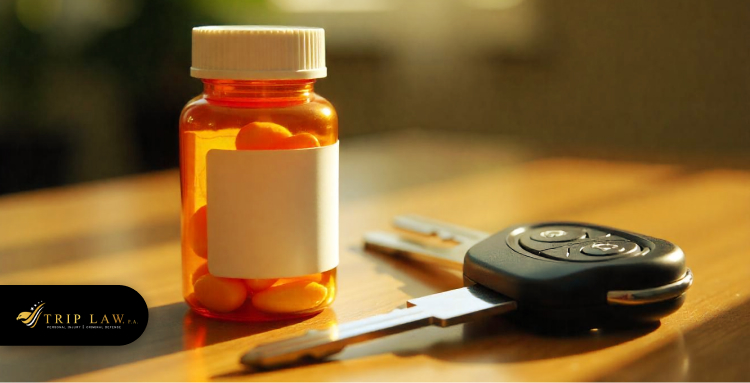
These stark penalties highlight the serious implications of driving under the influence of any drug in Wisconsin.
Drugged Driving Charges
In Wisconsin, driving under the influence of any drug, even those legally acquired, can result in an Operating While Intoxicated (OWI) charge. The state has a zero-tolerance policy for controlled substances found in a driver's system. This means that you could face OWI charges even if the drug does not impair your ability to drive but is simply present in your bloodstream, even as little as 1 ng/mL, substances like THC (tetrahydrocannabinol).
Surprisingly, Wisconsin law does not require proof of actual impairment to convict someone of drugged driving if a controlled substance is detected in their system. This strict policy highlights the importance of understanding how even legally prescribed drugs can affect your legal standing when driving.
Penalties for Drugged Driving
A first OWI offense can result in fines up to $300, a driver's license suspension for 6 to 9 months, and mandatory participation in a drug assessment program.
For repeat offenders, the consequences are even harsher, with increased fines, longer license suspensions, mandatory jail time, and the possibility of having your vehicle seized.
For example, a third OWI offense could lead to up to $2,000 in fines, up to 2 years of license revocation, and up to 1 year in jail.
(3) Legal Defenses and Considerations
Understanding these legal nuances helps drivers navigate Wisconsin’s stringent OWI laws more effectively and make informed decisions to avoid serious consequences.
➤ Valid Prescription Defense
Having a valid prescription might seem like a strong defense if you're caught driving under the influence of a legally prescribed drug in Wisconsin.
A prescription can justify possession but doesn’t necessarily protect you from OWI charges if the drug impairs your ability to drive.
The law focuses on impairment rather than the legality of the substance. This highlights the importance of understanding how your medications may impact your motor skills before driving.
Even if you're taking medication exactly as prescribed, you can still be charged with an OWI if law enforcement believes the drug is affecting your driving ability.
➤ The Burden of Proof
One of the most shocking aspects of Wisconsin’s OWI laws is that the state does not need to prove actual impairment to secure a conviction for drugged driving. Even a barely detectable amount of a restricted controlled substance in your system can lead to an OWI charge. In these cases, it heavily favors the prosecution. Drivers must be extremely cautious about driving after consuming any controlled substance.
(4) Best Practices for Travelers

These proactive approaches can prevent legal troubles and ensure that your travel plans proceed without incident.
Documentation
When traveling through Wisconsin with medications, it’s essential to carry them in their original prescription bottles. The labels on these bottles serve as immediate proof of legality, showing your name, the prescribing physician, and dosage instructions.
Additionally, it’s wise to keep a copy of your prescription or a doctor’s note handy. If questioned by law enforcement, it helps to avoid unnecessary legal complications.
Awareness of Local Laws
Familiarizing yourself with Wisconsin's drug laws before your trip is crucial. While it may be legal to possess certain substances in other states, Wisconsin’s regulations can differ significantly.
For instance, marijuana, legal in neighboring states, remains entirely illegal in Wisconsin. Being aware of these differences can save you from unintentional violations, fines, or even arrest.
Consulting Legal Counsel
If you’re ever uncertain about the legality of possessing specific substances while traveling through Wisconsin, consulting a legal professional is a smart move. A qualified attorney can provide personalized advice based on the latest legal developments and your unique situation.
Milwaukee Legal Pros: How We Can Help
When you're on the road, the last thing you want is to face legal complications, especially when they stem from carrying legally prescribed medications. At Milwaukee Legal Pros, our seasoned attorneys specialize in the intersection of Wisconsin’s drug and driving laws. Here’s how our legal assistance can help you :
Personalized Consultations for Every Situation
We know that every case is unique, and so are our consultations. When you reach out to Milwaukee Legal Pros, we take the time to understand your specific situation; whether you’re a resident or just passing through Wisconsin with your medication. Our consultations are designed to address your concerns, clarify your legal position, and offer practical steps to avoid future issues.
Strongly Create Defense Strategies to Protect Your Future
If you find yourself facing charges, Milwaukee Legal Pros is your strongest ally. We understand slight mistakes can leave a permanent mark on your record, potentially affecting your future opportunities, driving privileges, and personal reputation. We craft defense strategies according to your circumstances, aiming to minimize penalties and protect your future.
Keep You Informed And Prepared for Legal Representation
Legal troubles can be stressful, but they don’t have to be a part of your journey. In tricky situations like this, we provide the expert guidance you need. Even if you’re convicted, our team will represent you in court, fight for your dignity, and handle any trial stress that comes along. Reach out to us today for a free consultation. We will assess your situation, explore options, and dedicate our time to give you the best possible outcome.

January 18, 2025
How serious is a 1st time offense for public intoxication in Wisconsin?
In the hazy blur of late-night decisions, where the lines between reason and impulse are often smudged by the warmth of a drink, public intoxication can seem like a trivial consequence. Yet, in Wisconsin, it's a matter that can ripple through your life in ways you might not expect. You may find yourself standing in a courtroom, unsure of how you got there, wondering just how serious a first-time offense really is.
However, it may not seem like much at the time; public intoxication carries legal weight that can surprise even the most casual drinkers. So, let’s take a step back and think about it. What happens when that fleeting moment of freedom leads to a fine, a court appearance, or worse?
2. What Are the Legal Rules for Public Intoxication in Wisconsin?
The state law, as written in Wisconsin Statutes, addresses intoxication primarily through disorderly conduct and public drunkenness offenses, with nuances that vary from one jurisdiction to another.
State Law: Disorderly Conduct and Public Intoxication
Under Wisconsin Statute 947.01, disorderly conduct is the umbrella under which most public intoxication offenses fall. This statute criminalizes conduct that disturbs the peace, including behavior that is “brawling” or “loud and raucous.” Intoxication itself is not a crime—unless it leads to disorderly conduct. In other words, it's not illegal to simply be intoxicated in public, but if that intoxication results in disruptive behavior, the law may take action.
The penalties for such an offense can include fines and, in certain cases, up to 90 days in jail. However, jail time is more typical for repeat offenders or those whose actions are particularly egregious. The charge is usually a misdemeanor, and the consequences are less severe for first-time offenders.
Local Ordinances: The Key Differences
While state law provides a broad framework, it’s important to note that local ordinances in various Wisconsin municipalities can impose stricter regulations. Cities like Madison or Milwaukee, for example, may have more specific ordinances that govern public intoxication. These local laws often carry lower fines or more focused penalties, depending on the severity of the offense.
For example, in some locales, a simple citation for public drunkenness may be issued without any criminal charges—just a fine. Other areas might classify public intoxication as a civil violation, which means it doesn’t carry the same weight as a criminal conviction but can still result in hefty fines or mandatory community service.
The Gray Areas: When Public Intoxication Becomes a More Serious Offense
It’s crucial to understand that public intoxication becomes a more serious matter when it leads to other infractions. For example, if someone becomes violent or obstructs police officers while intoxicated, they could face charges beyond disorderly conduct, such as resisting arrest or battery to a law enforcement officer—both of which are more severe offenses with much steeper penalties.
3. What Are the Penalties for a First-Time Public Intoxication Offense?

It's important to understand that the penalties can vary widely depending on where the offense takes place and the specific circumstances surrounding the incident.
Fines and Forfeitures
For a first-time public intoxication offense, the most likely penalty you’ll encounter is a fine. These fines typically range from $25 to $300, depending on the jurisdiction. In some cases, fines may be imposed as a civil violation rather than a criminal conviction, especially in municipalities with stricter local ordinances. The exact amount will often be influenced by the severity of the situation, such as whether the intoxicated individual was disruptive, disorderly, or engaged in any other unlawful behavior.
License Suspensions
While public intoxication on its own will not lead to a suspension of your driver’s license, the situation becomes more complicated if the intoxicated individual is also charged with related offenses, particularly Operating While Intoxicated (OWI). Wisconsin has some of the strictest OWI laws in the country, and a conviction for even a first offense OWI can result in a license suspension, which can range from 6 to 9 months.
Jail Time
For a first-time offender, jail time is typically not a factor in public intoxication cases. Jail sentences are generally reserved for more severe instances, particularly if the intoxication leads to disruptive or violent behavior. For instance, if an individual becomes combative with law enforcement or other individuals while intoxicated, this can escalate the situation, leading to additional charges such as resisting arrest or battery, both of which carry the potential for jail time.
Community Service
In certain jurisdictions, especially those with higher tolerance for public intoxication, community service may be a possible penalty. Some cities in Wisconsin opt to require first-time offenders to complete community service hours as a way of ensuring rehabilitation rather than punishment. While it may not seem as daunting as jail time, it’s still an imposition that can take up your time and potentially affect your work or social life.
4. What Factors Can Impact Your Penalties for Public Intoxication?

While the penalties for public intoxication in Wisconsin are typically straightforward, several factors can elevate the severity of the consequences. These factors range from the individual’s Blood Alcohol Concentration (BAC) to the presence of aggravating circumstances, and even the history of prior offenses.
Blood Alcohol Concentration (BAC)
One of the most direct influences on the severity of penalties for public intoxication is an individual's Blood Alcohol Concentration (BAC). While the state doesn’t charge public intoxication simply based on BAC alone, a higher BAC can lead to more severe consequences. A BAC well above the legal limit of 0.08% could signal a higher degree of intoxication, leading to a greater likelihood of disorderly behavior or dangerous conduct.
In situations where a person’s BAC is particularly high, law enforcement may be more inclined to charge additional offenses like disorderly conduct or endangerment, which carry stricter penalties. The higher the BAC, the more likely it is that the person’s behavior will escalate into something more disruptive or unsafe, thus influencing the final judgment or penalty.
Aggravating Circumstances
In any legal matter, context matters. When it comes to public intoxication, there are certain aggravating circumstances that can significantly elevate the potential penalties. For instance, if an individual’s intoxication leads to disorderly conduct, public disturbances, or conflicts with law enforcement, the consequences will certainly be harsher.
Furthermore, the presence of minors can also exacerbate the situation. In cases where a person is intoxicated in public near minors or engages in behavior that could endanger them, the court may impose stricter fines or sentencing. Similarly, if the person is found participating in other criminal activities—such as vandalism, assault, or public property damage—their public intoxication charge can quickly spiral into much more severe criminal charges, each carrying its own set of penalties.
Prior Offenses
Wisconsin’s legal system often views repeat offenders more harshly, even for something as seemingly minor as public intoxication. If you have previous convictions for public intoxication or any other offenses, you may find yourself facing more serious charges, regardless of how much time has passed.
5. The Court’s Stage: What’s It Like to Face It?
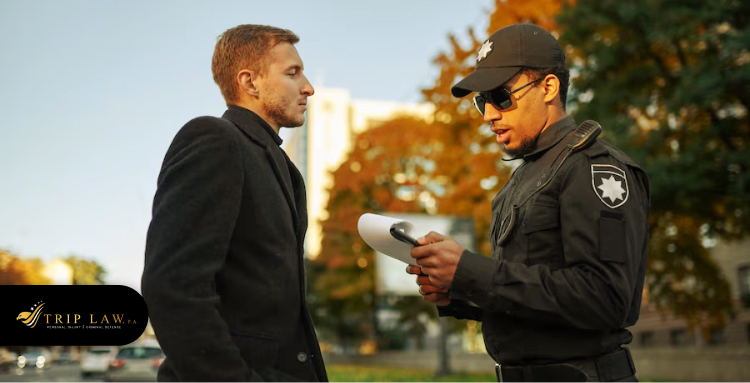
The path from citation to possible resolution involves several stages, each offering its own set of expectations and potential outcomes.
Citation Issuance
The journey often begins with the issuance of a citation by law enforcement. If you are cited for public intoxication, the officer will provide you with a ticket that outlines the specific offense, the fine you’re expected to pay, and the date by which you must respond. Unlike more serious criminal offenses, public intoxication typically does not involve an immediate arrest, unless additional circumstances—such as violence or obstruction of justice—are involved.
In most cases, this citation serves as an initial notice that your behavior has drawn the attention of law enforcement, and it provides instructions on how to proceed. You will usually have the option to either pay the fine directly or contest the charge in court. If you opt to contest it, the citation will include information on when and where your court appearance will take place.
Court Appearance
For first-time offenders, the court appearance may feel like a formality, especially if you choose to simply pay the fine and avoid further legal involvement. However, if you decide to contest the charge, you will be required to appear before a judge in a local municipal or circuit court. During this appearance, you will have the opportunity to present your case, either on your own or with the assistance of an attorney.
The court process is generally straightforward for public intoxication cases, but it still requires your attention. You will be asked to enter a plea of guilty, not guilty, or no contest. If you plead guilty or no contest, the judge will determine the appropriate penalty, which may include a fine, community service, or in some cases, diversion programs. If you plead not guilty, the case may be set for a trial, where evidence will be presented, and the judge or jury will determine whether the charge should be upheld.
For those with no criminal history, the court will typically aim for a resolution that focuses on rehabilitation rather than punishment.
6. Will Public Intoxication Leave a Mark on Your Record?
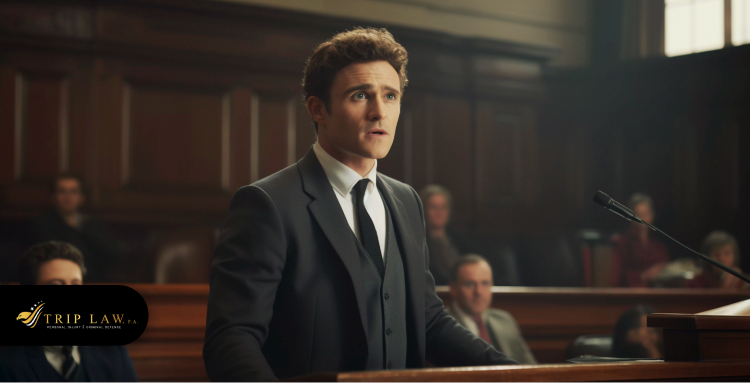
The implications of a public intoxication charge on your criminal record can vary significantly depending on whether the offense is classified as a misdemeanor or a civil violation.
Misdemeanor vs. Civil Violation
Most often, public intoxication is charged as a civil violation under local ordinances, especially in cities where the law takes a more lenient approach to public drinking. In this case, a citation would be issued, and the individual would face fines or other non-criminal penalties, such as community service. Importantly, a civil violation does not result in a criminal conviction and therefore would not appear on your criminal record.
However, if the intoxication is accompanied by disorderly conduct or any other criminal behavior—such as resisting arrest or public fighting—the charge may escalate into a misdemeanor. Misdemeanors, unlike civil violations, are criminal offenses and carry the potential for a criminal record. A misdemeanor conviction can have more serious long-term consequences, including impacts on employment, professional licensing, and other areas where background checks are required.
Record Expungement
In Wisconsin, expungement is generally available for certain offenses, but it requires the individual to meet specific criteria. If convicted of a misdemeanor for public intoxication or related offenses, you may be eligible to petition for expungement after completing the sentence (such as fines, community service, or probation). However, expungement is only available for certain first-time offenses and is not granted automatically—it requires a formal petition to the court.
To qualify for expungement in Wisconsin, the offense must typically be one that occurred before the age of 25. For offenses that occur after this age, expungement may still be available, but the criteria are more stringent. The court will consider factors such as the nature of the offense, whether you have complied with the terms of your sentence, and whether you have remained law-abiding since the conviction.
Milwaukee Legal Pros Stand by You When It Matters Most
We can provide invaluable assistance in a public intoxication case, especially for first-time offenders who may feel overwhelmed by the legal process. Here’s how we can help:
1. Legal System with Expertise
Our experienced attorneys understand the nuances of public intoxication laws and local ordinances in Wisconsin. We can analyze the specifics of your case to identify potential defenses or mitigating factors. This knowledge can make the difference between a simple fine and a more favorable outcome, such as dismissal or reduced penalties.
2. Building a Strong Defense
We can review evidence, such as police reports or witness statements, to challenge the legitimacy of the citation. For example, we may argue that your behavior didn’t meet the legal definition of public intoxication or that your rights were violated during the citation process.
3. Exploring Alternative Resolutions
We’ve got top-notch negotiators. We can advocate for alternative outcomes, like diversion programs or community service, which may prevent a misdemeanor charge from affecting your criminal record.
4. Expungement Assistance
If you’ve already been convicted, we can guide you through the expungement process, helping to clear your record. Our expertise ensures you meet the eligibility requirements and submit the necessary documentation correctly.

January 18, 2025
Is it illegal to aim a loaded rifle at people in Wisconsin?
Firearms, for many, are not merely tools but a heritage—a connection to tradition, self-reliance, and, perhaps, a sense of security. Yet, in the shadow of this bond lies a question: what happens when the line between safety and recklessness begins to blur?
The law, often clear in its intent yet complex in its application, watches closely. In Wisconsin, to point a loaded firearm at another is to tread a path that is as precarious as it is consequential.
But before we rush to judge or justify, let us pause. Let us understand the weight of this action—not just in its legal implications but in its moral resonance. In the end, it is not just about what the law forbids but what the act itself says about who we are and the choices we make in moments of fear, anger, or desperation.
Is It Illegal to Point a Loaded Rifle at Someone in Wisconsin?
The laws surrounding firearms in the state are designed to balance the rights of responsible gun ownership with the critical need to protect public safety.
Wisconsin Statutes on Endangering Safety
Under Wisconsin Statute § 941.20, it is a crime to endanger safety by using a dangerous weapon. Specifically, this statute prohibits individuals from intentionally pointing a firearm at another person, regardless of whether the firearm is loaded or unloaded. The mere act of aiming a weapon, even without discharging it, is considered inherently dangerous and likely to provoke fear or escalate a conflict.
This law reflects a recognition of the potential for such actions to lead to harm, whether physical or psychological. Violations of this statute can result in criminal charges, ranging from misdemeanors to felonies, depending on the circumstances and intent behind the act.
Pointing a Firearm and the Question of Intent
The act of aiming a loaded rifle at someone can also intersect with charges of recklessly endangering safety under Wisconsin Statute § 941.30. This statute addresses behavior that shows a disregard for human life or safety. Aiming a loaded firearm at another person without a clear, lawful reason—such as imminent self-defense—could fall squarely within this definition.
Penalties for Illegally Aiming a Loaded Firearm
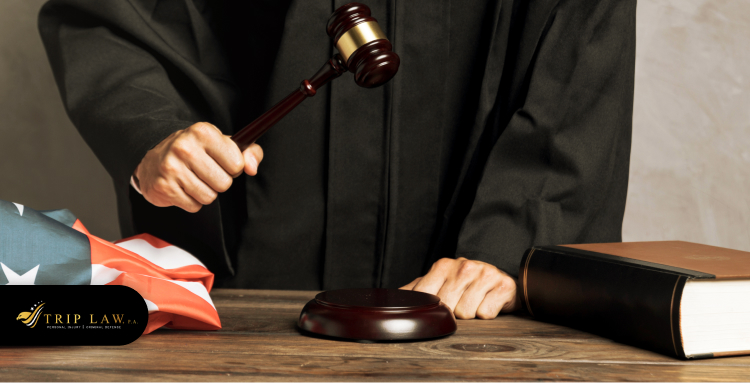
The state views such actions as dangerous, and its penalties reflect the seriousness of the offense. Whether classified as a misdemeanor or a felony, the consequences can ripple through an individual’s life, affecting not just their freedom but their rights as a firearm owner.
Misdemeanor vs. Felony: How the Charges Are Determined
The severity of the charges depends on the context and intent behind the act, as well as the degree of danger posed to others. Here’s a breakdown:
Misdemeanor Charges
Aiming a loaded firearm without intent to harm but in a reckless or negligent manner may result in misdemeanor charges.
For example, if someone points a rifle during an argument as a misguided attempt to intimidate, but no physical harm occurs, it could be treated as a Class A misdemeanor under Wisconsin Statute § 941.20 (endangering safety by use of a dangerous weapon).
Penalties: Up to 9 months in jail, fines up to $10,000, or both.
Felony Charges
If the act involves clear intent to harm, or if it creates a significant risk of bodily injury, felony charges are likely.
Recklessly endangering safety under Wisconsin Statute § 941.30 is often applied in such cases.
Depending on whether the act is categorized as first-degree (conduct showing utter disregard for human life) or second-degree (creating an unreasonable risk), penalties can escalate significantly.
Penalties for First-Degree Recklessly Endangering Safety: Up to 12 years and 6 months in prison, fines up to $25,000, or both.
Penalties for Second-Degree Recklessly Endangering Safety: Up to 10 years in prison, fines up to $25,000, or both.
Legal Consequences Beyond Fines and Imprisonment
The legal fallout from illegally aiming a firearm doesn’t end with sentencing. There are broader implications that can profoundly affect an individual’s life:
Loss of Firearm Ownership Rights
A felony conviction leads to a lifetime ban on owning or possessing firearms under federal and state law. This prohibition applies even after the individual has served their sentence.
Criminal Record and Employment Implications
Both misdemeanor and felony convictions create a criminal record, which can hinder future employment opportunities, especially in roles requiring background checks or security clearance.
Civil Liability
In addition to criminal charges, individuals may face civil lawsuits from those impacted by their actions. Plaintiffs could seek compensation for emotional distress or other damages caused by the incident.
Exceptions: When Is It Legally Justifiable?

In Wisconsin, aiming a loaded firearm at someone is not an act taken lightly, but there are exceptions where such an action may fall within legal boundaries. These exceptions primarily center around self-defense and defense of others, rooted in the state's well-defined statutes.
The Foundation: Wisconsin’s Self-Defense Laws
Under Wisconsin Statute § 939.48, self-defense is a legally recognized justification for the use or threat of force, including the aiming of a firearm, provided certain conditions are met.
Key elements of lawful self-defense include:
The imminence of Threat: The danger must be immediate and unavoidable. Hypothetical or future threats do not justify the use of force.
Reasonable Belief: The individual must genuinely and reasonably believe that force is necessary to prevent harm. This belief is judged from the perspective of a reasonable person in similar circumstances.
Proportionality: The response must match the level of the threat. For instance, aiming a loaded firearm at someone is only justifiable if the threat posed is severe, such as facing an armed assailant.
Stand Your Ground vs. Duty to Retreat
Wisconsin does not have a broad Stand Your Ground law. However, it does provide protections under the Castle Doctrine, which applies to incidents occurring in a person’s home, vehicle, or place of business. Under this doctrine, an individual has no duty to retreat before using force if an intruder unlawfully enters or attempts to enter these spaces.
Scenarios Where Aiming a Loaded Firearm May Be Lawful
Home Invasion: An individual in their home confronts an intruder who forcibly breaks in. Under the Castle Doctrine, aiming a firearm to deter or stop the threat may be legally justified.
Defense Against Armed Aggression: If someone is faced with an attacker wielding a weapon, aiming a loaded firearm in response could be seen as a reasonable defensive measure, provided it is necessary to prevent harm.
Protecting Others: If a person witnesses an imminent threat to another individual, such as a robbery or assault involving a weapon, aiming a firearm to stop the aggressor may also be lawful under self-defense statutes.
Cautionary Notes
Even when self-defense laws apply, the justification for aiming a loaded firearm can be scrutinized. Prosecutors may question whether the individual genuinely faced imminent harm or acted proportionally. Moreover, any misstep—such as escalating the situation unnecessarily or acting recklessly—can weaken a self-defense claim.
How Milwaukee Legal Pros Can Win It: Defending Firearm Pointing Cases

1. Expert Legal Guidance in Firearm Pointing Cases
Milwaukee Legal Pros are experts in Wisconsin’s firearm laws, especially when it comes to cases involving the illegal pointing of firearms. With a deep understanding of both state and federal regulations, we provide clients with a clear and tailored defense strategy. Our team ensures that every aspect of your case is thoroughly examined, from the intent behind the action to the specific circumstances that led to the firearm being aimed. This expertise allows us to craft a defense that’s both legally sound and strategically advantageous.
2. Building a Strong Case: Evidence and Legal Nuances
In cases of pointing a loaded firearm, the circumstances can vary widely. Whether it was an accidental aim, a situation involving self-defense, or a case of reckless endangerment, Milwaukee Legal Pros know how to analyze the facts. We carefully scrutinize all available evidence—whether physical, testimonial, or circumstantial—to challenge the prosecution’s narrative. Our team works to identify any legal nuances, such as whether the act was indeed reckless or whether it was a justified use of force, which is particularly important in self-defense cases. By understanding these subtleties, we can build a defense that addresses the complexity of each situation.
3. Negotiation and Mitigation of Charges
Firearm pointing charges can carry severe penalties, but with our extensive experience in negotiations, Milwaukee Legal Pros can often secure reduced charges or favorable plea deals. We leverage our knowledge of the legal landscape and our relationships with prosecutors to explore all possible avenues for mitigating the penalties. Whether through negotiating a plea agreement or seeking a reduced charge, our focus is always on minimizing the impact on our client’s lives, including potential jail time, fines, or a criminal record.
4. Advocating for Client Rights
Our primary goal is to protect your rights. In cases involving the unlawful pointing of a firearm, we ensure that your defense is handled with the utmost care, preserving your legal rights. Whether through aggressive litigation in court or thoughtful legal strategy outside the courtroom, we advocate fiercely for our clients to achieve the best possible outcome. We are committed to ensuring that any firearm-related charges are challenged effectively, with full consideration of your rights and interests.

December 28, 2024
What Should You Do if You’re Injured in a Truck Accident
A truck accident can upend your life in an instant. One moment, you’re navigating Milwaukee’s bustling streets; the next, you’re facing serious injuries, vehicle damage, and an overwhelming list of decisions that demand immediate attention. It’s disorienting and, for many, deeply unsettling.
We recognize the physical pain and emotional strain that can accompany such a traumatic event. That’s precisely why we’re here—to guide you forward with clarity and confidence during this critical time. Here’s what you need to know and do following a truck accident in Milwaukee to ensure you are fully protected.
(1) Call Emergency Services: Your First Crucial Step
Your first priority after a truck accident is to alert emergency services by calling 911. This ensures that both medical assistance and law enforcement are dispatched to the scene promptly. In Wisconsin, state law requires drivers to report any accident resulting in injury, death, or significant property damage.
When the Milwaukee Police Department or other local authorities arrive, they will document the scene, assess fault, and compile a formal accident report. This report serves as a vital record, capturing critical information such as weather conditions, vehicle positions, and witness statements. By involving law enforcement immediately, you not only comply with Wisconsin legal requirements but also lay the foundation for a strong personal injury claim.
(2) Prioritize Your Health: Seek Medical Attention Promptly
Truck accidents can lead to serious injuries, including spinal damage, head trauma, and fractures. Often, the most significant injuries may not be immediately obvious, as symptoms can take hours or even days to appear. It’s important to seek medical attention without delay, even if you feel fine at first.
A prompt medical evaluation is essential for two key reasons:
It ensures that any injuries are properly diagnosed and treated, and it provides important documentation for your personal injury case.
Medical records, including doctor’s notes and diagnostic results, play a pivotal role in linking your injuries to the accident, strengthening your case to pursue legal action.
(3) Preserve Evidence at the Scene for a Stronger Case
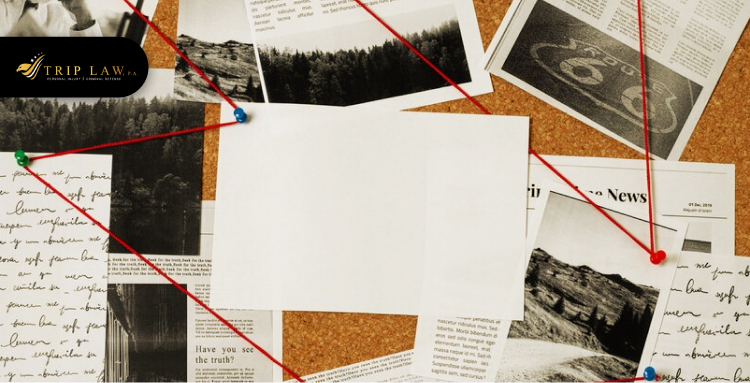
If your physical condition allows, collecting evidence at the scene is crucial for supporting your case. The more detailed the documentation, the stronger your position will be in any subsequent claims or legal actions.
Photos or videos: Start by taking clear photographs or videos of the accident scene. Capture shots of the truck, your vehicle, and the surrounding area. Be sure to include visible damage, license plates, and any injuries you or others may have sustained. This visual evidence will be vital in illustrating the extent of the collision.
Witness information: Next, speak with any witnesses. Obtain their full names, contact details, and a brief account of what they saw. Their testimonies can add credibility and depth to your version of events.
Truck details: Note any relevant details about the truck involved, such as the trucking company’s name, truck license number, and identifying markings. The more specific the information, the easier it will be to trace the vehicle. Additionally, this approach will uncover any critical safety violations or regulatory breaches.
(4) Protect Yourself: Why Not Admitting Fault Can Benefit You
In the aftermath of a truck accident, it’s essential to refrain from admitting fault, whether to the truck driver, their employer, or even law enforcement. While emotions may be high and the urge to explain yourself strong, it’s crucial to stick to the facts when describing the incident.
In Wisconsin, as in many other states, fault in an accident is determined based on the available evidence and the specifics of the law. Even a minor comment about the accident could be misinterpreted as an admission of responsibility, which may complicate your case later.
For example, phrases like "I'm sorry" or "I didn’t see you" may be taken out of context and used against you, even if they were not intended to admit fault. The legal process involves a careful review of the evidence, and prematurely claiming fault could limit your ability to recover compensation, particularly in light of Wisconsin’s comparative negligence laws.
(5) Notify Your Insurance Provider Wisely and Strategically

It’s important to notify your insurance company about the accident as soon as possible, as most policies require prompt reporting. Be truthful when providing the details, but avoid offering a recorded statement until you've consulted with an attorney.
Consulting with a lawyer before giving a recorded statement ensures that you’re protected. They can guide you on what to say, ensuring that your words cannot be misinterpreted or twisted. Insurance adjusters are trained to look for inconsistencies or statements that could potentially be used to minimize your claim.
While it's your responsibility to report the accident, remember that adjusters may seek to downplay your damages or shift the blame. Anything you say in an initial conversation can be scrutinized and used against you later in the claims process. That’s why, it’s best not to notify your auto insurance company about the accident when you don't intend to use coverage.
(6) Understand Wisconsin’s Comparative Negligence Law
In Wisconsin, compensation can be reduced if you’re found partially at fault for the accident, thanks to the state’s comparative negligence law. Under this statute, you can still recover damages even if you're partially responsible, but your settlement or verdict will be reduced in proportion to your percentage of fault.
For example, if the court determines you were 20% at fault, your recovery will be reduced by 20%. That means, for an accident where the total damages are $100,000, you would be able to recover $80,000.
However, Wisconsin law also states that if you are more than 50% at fault for the accident, you are barred from recovering any damages. This means that if your fault exceeds 50%, you will not be entitled to compensation for injuries or property damage.
Why Milwaukee Legal Pros Is the Right Choice for You
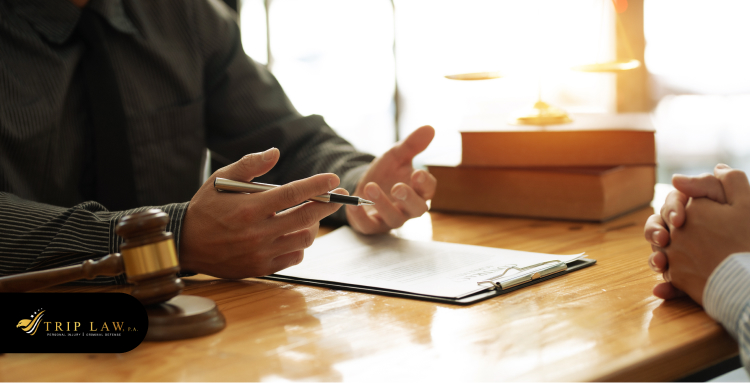
Truck accidents present unique challenges that go beyond the typical car accident. Involving multiple parties such as trucking companies, insurance providers, and federal regulations, these cases require a high level of expertise. An experienced personal injury attorney can navigate these complexities and ensure your rights are fully protected.
Here’s how Milwaukee Legal Pros can assist you:
We will meticulously investigate the accident, reviewing all aspects of the incident, including the driver’s logbooks, truck maintenance records, and any violations of federal trucking regulations.
Our team manages all communication with insurance companies and trucking firms. We’ll handle all negotiations, and ensure you’re not taken advantage of and that you receive fair treatment.
We will work tirelessly to secure the maximum compensation you’re entitled to, covering not just medical bills and lost wages, but also pain and suffering and long-term care costs.
Contact us today for a free consultation. Let us help you get the compensation you deserve and provide the expert legal support you need during this difficult time.

December 21, 2024
How to Prove Negligence in a Slip and Fall Accident in Milwaukee
One moment, you are going about your day—feeling secure and in control. The next, you are lying on the ground, hurt and uncertain about what comes next. A slip-and-fall isn’t just an accident; it’s a disruption of your life, a jarring reminder that safety isn’t always guaranteed. However, you don’t have to accept the consequences quietly.
Every detail matters. From identifying hidden hazards to gathering critical evidence, the way you handle the situation can make all the difference. In Milwaukee, the law is clear, but the first step is yours. Here’s how to build a powerful case and reclaim control of what’s been taken from you.
1) Understand the Duty of Care in Milwaukee Slip and Fall Cases
In Milwaukee, property owners have a responsibility to keep their premises safe. This obligation, known as the duty of care, depends on why you were on the property.
Invitees, such as customers in a store, are owed the highest level of care. Property owners must regularly inspect for hazards and address them promptly.
Licensees, like social guests, are owed a safe environment but without the same rigorous inspections. Owners must warn of any known dangers.
Trespassers have limited rights, but property owners cannot create conditions intended to cause harm.
To prove negligence, you must demonstrate that the property owner owed you a duty of care based on your status on the property. For more about safety standards and regulations, visit the U.S. Consumer Product Safety Commission.
2) How to Establish a Dangerous Condition in a Slip and Fall Accident
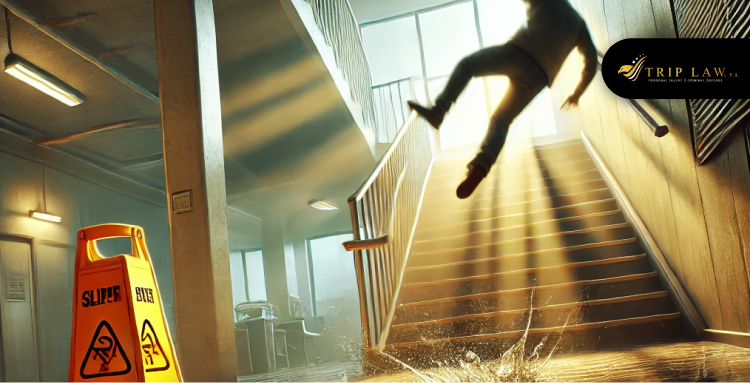
You need to show that a hazardous condition existed on the property. Common examples of dangerous conditions include:
Wet floors without visible warning signs increase the risk of slipping.
Uneven pavement can easily cause trips and falls.
Poor lighting in areas like stairwells makes it hard to see potential hazards.
Loose rugs or flooring can catch your feet and cause sudden falls.
Documenting the dangerous condition is necessary. Take photographs, gather surveillance footage, and collect witness statements to support your claim. These pieces of evidence show the property owner knew or should have known about the hazard and failed to address it. Explore the National Floor Safety Institute (NFSI) for research and statistics on common hazards. Their studies reveal how dangerous conditions cause slip-and-fall incidents, offering credible data to strengthen your case.
3) Prove the Property Owner Knew (or Should Have Known) About the Hazard
To prove negligence, you must show that the property owner knew about the hazardous condition or should have reasonably known about it. There are two key questions to consider when establishing this:
Was the hazard left unattended for an unreasonable amount of time?
A long-standing spill, loose rug, or uneven pavement signals the property owner's failure to address hazards promptly. For example, if a spill in a store was ignored for hours, it shows negligence. The longer the hazard is present, the more likely the owner should have noticed and fixed it.Did the property owner fail to conduct routine maintenance or inspections?
Property owners are expected to regularly inspect their premises for safety hazards. If the owner neglected routine inspections or failed to maintain the property, it can demonstrate that they were negligent in preventing accidents. If a stairwell light burned out weeks ago and remained unrepaired, the owner likely knew about its dangerous condition.
Gathering evidence is important in proving the owner’s knowledge or lack of action. Employee testimonies, maintenance records, or surveillance footage can show that the owner was aware of the hazard or should have noticed it. This evidence will help strengthen your case by demonstrating that the property owner’s inaction directly contributed to your injury.
4) Show the Owner Failed to Act in Addressing the Hazard

Once the property owner is aware of a hazard, they have a duty to take action. If they fail to fix the problem or warn visitors about the danger, you can establish negligence. Here’s how:
Ignoring the hazard
If the property owner notices a problem and ignores it, they clearly neglect their responsibility to maintain a safe property. For example, if an employee sees a spill in an aisle and ignores it, they risk shopper safety.
Failing to address it promptly
If the owner knows of a hazard and fails to fix it within a reasonable time, they act negligently. If a broken step is left unrepaired for days or weeks, the owner is not acting swiftly to protect visitors.
Not providing sufficient warnings
If a dangerous condition exists, the owner should warn people about it. For instance, if a wet floor is left without a warning sign, visitors won’t be aware of the risk. A simple sign could have prevented the accident.
Property owners are expected to maintain safe conditions not only to prevent injuries but also to meet legal standards. For instance: the Occupational Safety and Health Administration (OSHA) emphasizes the importance of identifying and correcting slip-and-fall hazards in workplaces and public spaces.
5) How to Connect the Property Owner's Negligence to Your Injury
To prove negligence, show that the property owner’s actions or inactions directly caused your slip, fall, and injuries. This connection is essential for a strong case.
Medical records
Your medical records can demonstrate that the injuries you sustained were the result of the fall. Doctors’ notes, diagnoses, and treatment plans help establish the direct link between the incident and your physical harm.
Accident reports
Filing an accident report at the time of the incident can serve as an official document confirming the circumstances of your fall. This report provides important details about the hazardous condition and the events leading up to your injury.
Witness testimonies
If anyone saw the accident happen, their statements can help clarify how the hazard contributed to your fall. A witness who saw you slip on a wet floor or uneven pavement can directly link the hazard to your injury.
This evidence proves the property owner's negligence caused your harm, strengthening your case and supporting your compensation claim.
6) Understanding Wisconsin’s Comparative Negligence Law in Slip and Fall Cases
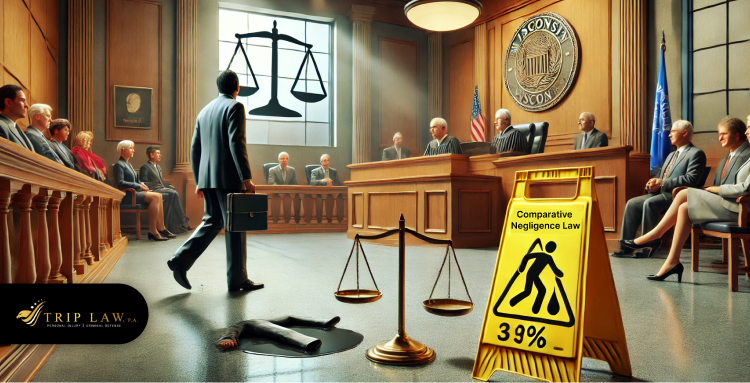
Wisconsin follows a comparative negligence rule, meaning the court will reduce your compensation if you share any responsibility for the accident. The amount of fault you carry will directly impact how much you can recover.
If you ignored a visible “wet floor” sign and slipped, the court may assign partial fault to you. If the court finds you 20% responsible, your compensation will be reduced by that same percentage.
Understanding this rule is important because it can affect your case. Even if you’re partially at fault, you can still receive compensation, but the amount will be adjusted. A skilled lawyer will guide you through this process, ensuring the facts are clear and your level of fault is accurately determined.
7) Why Milwaukee Legal Pros is Your Best Choice for Slip and Fall Claims
Dealing with the legal process after a slip and fall accident can feel complicated, especially when insurance companies are involved. A skilled personal injury attorney can help in several ways:
Gather and preserve evidence
To prove negligence in a slip-and-fall accident, having strong evidence is critical. Milwaukee Legal Pros will collect photos, accident reports, and witness statements to establish how the property owner's negligence caused your injuries. This evidence can strengthen your case and make it harder for the other side to deny responsibility.
Negotiate with insurance companies
Insurance companies often try to minimize payouts or deny claims entirely, making it hard for victims to get fair compensation. Our experienced attorneys know the tactics insurers use and will fight to get you the compensation you deserve. By negotiating on your behalf, we ensure you are not taken advantage of during this process.
Represent you in court, if necessary
If the insurance company refuses to offer a fair settlement, Milwaukee Legal Pros will take your case to court. Our attorneys are prepared to advocate for you, presenting compelling evidence and arguments to prove negligence and secure a favorable outcome. You can rely on us to guide you through every step of the legal process.
We know the impact a slip and fall can have on your life. Our team will work hard to prove negligence and fight for the compensation you deserve. Contact us today for a free consultation, and let us start working on your case.

December 14, 2024
Do I Need a Lawyer for a Minor Car Accident in Milwaukee
At first glance, a minor car accident might feel like nothing more than a passing inconvenience. A fender bender, a small disruption in the flow of your day. But life, as it often does, has a way of revealing the cracks beneath the surface. What begins as a simple mishap can twist into something more complex—hidden injuries that don’t show themselves until later, insurance companies questioning your claims, and complications you never anticipated. It’s tempting to brush it off, to tell yourself it’s not worth involving anyone else. But even the smallest events can grow beyond your control.
Here in Milwaukee, the question of whether to hire a lawyer after a minor accident is not one to take lightly. The answer could be the line between protecting what’s rightfully yours and falling into costly missteps. So let’s take a closer look at the factors at play—the ones that will help you decide if seeking legal help is the right choice for your situation.
1) When You Might Not Need a Lawyer
In some cases, handling a minor car accident on your own makes sense. If the circumstances are straightforward, you can likely navigate the process without legal assistance. Here’s when going solo might work:
No Injuries or Minimal Vehicle Damage
If everyone involved walked away without any injuries and the damage to the vehicles is minimal, hiring a lawyer may not be necessary. Medical concerns often complicate cases, but if you’re confident there are no physical effects—now or later—you can usually handle the matter directly with your insurance provider. Always document the scene thoroughly with photos and a written account, as this can help close the case quickly.
Clear Liability and Agreement Between Parties
When both parties agree on who caused the accident and there’s no dispute over fault, resolving the situation becomes much simpler. Wisconsin follows an at-fault system, meaning the driver responsible for the accident is liable for damages. If the facts of the accident are undisputed and the other driver’s insurance accepts fault, you can likely reach a resolution without legal help.
Quick and Fair Insurance Settlements
Insurance companies can sometimes process claims efficiently, particularly for minor accidents where liability is clear. If your insurer or the at-fault driver’s insurer promptly pays for the damages and you’re satisfied with the settlement, you might not need to involve a lawyer. Just be sure to review the settlement carefully to confirm it fully covers your expenses before accepting the payment.
2) When a Lawyer Could Be Beneficial

Even a minor car accident can bring unexpected complications, making legal assistance invaluable. Here are scenarios where hiring a lawyer can make all the difference:
Late-Appearing Injuries Like Whiplash or Concussions
Not all injuries show up immediately after an accident. Conditions like whiplash, concussions, or soft tissue injuries may take days—or even weeks—to fully manifest. Without a lawyer, it can be challenging to prove these injuries are related to the accident, especially when insurance companies question the timing. A skilled attorney can gather the necessary medical evidence and negotiate with insurers to secure fair compensation for late-appearing injuries.
Disputes With Insurance Companies Over Claims
Dealing with insurance companies can be frustrating, especially when they deny claims, offer inadequate settlements, or challenge liability. Adjusters may downplay the extent of your damages or delay payments, leaving you without the support you need. An attorney will know how to counter these tactics, ensuring you receive the compensation you deserve without unnecessary delays.
Shared Fault and Wisconsin’s Comparative Negligence Rule
Wisconsin’s comparative negligence law can complicate even minor accidents. If you’re partially at fault, your compensation decreases based on your share of the blame. For example, if you’re found 20% at fault, you can only recover 80% of your damages. When liability is unclear or disputed, an attorney can build a strong case to minimize your fault percentage and maximize your recovery.
Inadequate Settlement for Out-of-Pocket Costs
Repair bills, medical costs, and other expenses can quickly exceed what the insurance company offers in a settlement. If your compensation falls short of covering your actual losses, a lawyer can fight for a better outcome. This is especially important if future expenses, like ongoing medical care or vehicle depreciation, aren’t accounted for in the initial offer.
Wisconsin’s Legal and Insurance Complexities
From understanding your insurance policy’s fine print to complying with the state’s three-year statute of limitations for personal injury claims, there are many legal details to manage. An experienced attorney will handle these complexities for you, ensuring every deadline is met and no opportunities for compensation are overlooked.
3) Key Legal Considerations for Car Accidents in Milwaukee

When dealing with a car accident in Milwaukee, understanding Wisconsin’s unique legal and insurance requirements can help you navigate the aftermath more effectively. Here’s what you need to know:
Wisconsin’s Minimum Car Insurance Requirements
Wisconsin operates under an at-fault insurance system, which requires drivers to carry liability coverage to pay for damages if they cause an accident. The minimum insurance requirements in Wisconsin are:
$25,000 for bodily injury or death per person.
$50,000 for bodily injury or death per accident involving multiple people.
$10,000 for property damage.
While these limits meet legal requirements, they may not fully cover damages in more severe accidents. Ensuring you have sufficient coverage—like uninsured/underinsured motorist protection—can safeguard you from significant financial burdens.
Handling Claims Against Uninsured or Underinsured Drivers
Not all drivers on Milwaukee roads carry adequate insurance, despite it being legally required. If you’re hit by an uninsured or underinsured driver, recovering compensation becomes more challenging. In such cases, your own uninsured/underinsured motorist coverage (UM/UIM) can step in to cover damages. However, insurers often contest UM/UIM claims, making it crucial to have legal representation to secure a fair payout.
Statute of Limitations
Wisconsin enforces a three-year statute of limitations for personal injury claims resulting from car accidents. This means you have three years from the date of the accident to file a lawsuit. Missing this deadline can forfeit your right to compensation, even if your injuries or damages are significant. It’s equally important to act quickly for property damage claims, as they may have shorter timeframes depending on your insurance policy.
4) How a Lawyer Can Help

When you’re involved in a car accident, even a minor one, having an experienced lawyer in your corner can make all the difference. Milwaukee Legal Pros is here to ensure you’re protected, informed, and fully compensated. Here’s how we can help:
Free Case Evaluation to Assess Your Legal Needs
We start with a thorough case evaluation. Our team examines the details of your accident, from police reports to medical records, to determine if pursuing legal action is the best course. We offer clear, practical advice so you can make informed decisions about your next steps, whether that involves filing a claim, negotiating a settlement, or taking the matter to court.
Managing All Communications With Insurance Adjusters
Dealing with insurance adjusters can be stressful and time-consuming, especially when they’re trained to minimize payouts. We step in to handle all communications with insurance companies on your behalf. Milwaukee Legal Pros knows how to counter lowball offers and push back against tactics designed to devalue your claim, allowing you to focus on recovery instead of paperwork.
Ensuring Full Compensation for Medical Costs and Damages
Beyond covering obvious costs like vehicle repairs, you deserve compensation for every loss the accident caused. This includes medical expenses, lost wages, future treatment needs, and even pain and suffering. Milwaukee Legal Pros conducts a comprehensive analysis of your damages, ensuring no aspect of your claim is overlooked. Our goal is to secure the maximum compensation you’re entitled to under Wisconsin law.
Meeting Legal Deadlines and Avoiding Costly Mistakes
Navigating Wisconsin’s legal system can be daunting without expert guidance. From filing claims within the state’s three-year statute of limitations to meeting insurance deadlines and addressing legal complexities, we make sure your case stays on track.

December 5, 2024
In Wisconsin, Can Someone Sue You Exactly 3 Years and 5 Days After An Auto Accident For Personal Injury?
In Wisconsin, individuals who want to file a personal injury lawsuit stemming from an auto accident must do so within a specific time frame as per the law. According to Wisconsin Statute § 893.54, the statute of limitations for such cases is typically three years from the date of the accident. If someone tries to sue you 3 years and 5 days after the accident, the statute of limitations will likely bar their lawsuit, unless an exception applies.
Understanding this legal timeframe is crucial for both accident victims seeking compensation and those defending against potential claims. Here are a few key considerations:
General Rule: Wisconsin's Three-Year Personal Injury Deadline
Wisconsin law requires individuals to file personal injury claims within 3 years from the date of the accident. This rule ensures the timely resolution of legal disputes. Additionally, it preserves the integrity of evidence, including witness testimonies and physical documentation, which may deteriorate over time.
If you miss the three-year deadline to file their claim, you are usually prohibited from taking legal action. This rule applies no matter how strong your case is or how clear the evidence of fault or damages might be.
Therefore, you should act promptly when pursuing compensation for injuries, medical expenses, property damage, or other losses resulting from an accident. Missing the deadline can lead to a permanent loss of the opportunity to recover damages. You will have to stand the financial and personal burdens alone.
Are There Any Exceptions to Wisconsin's Three-Year Personal Injury Rule?
Wisconsin law allows several exceptions to the standard 3-year statute of limitations for personal injury claims. These exceptions account for unique circumstances that might delay a claimant's ability to file on time. Here’s how they work:
Wrongful Death: If someone passes away due to injuries from an accident, the timeline for filing a wrongful death claim is different. You usually have 2 years from the date of the person’s death to start the legal process under Wisconsin Statute § 893.54(2m). This gives families time to grieve while still protecting their legal rights.
Discovery Rule: Sometimes, injuries aren’t immediately apparent after an accident. If the injured person couldn’t reasonably discover their injury within the standard time frame, the timeline for filing a lawsuit might begin later. This situation falls under Wisconsin’s discovery rule (§804), which applies to statutes of limitations. Under this rule, the clock starts ticking when the injury is discovered or reasonably should have been discovered, not from the accident date.
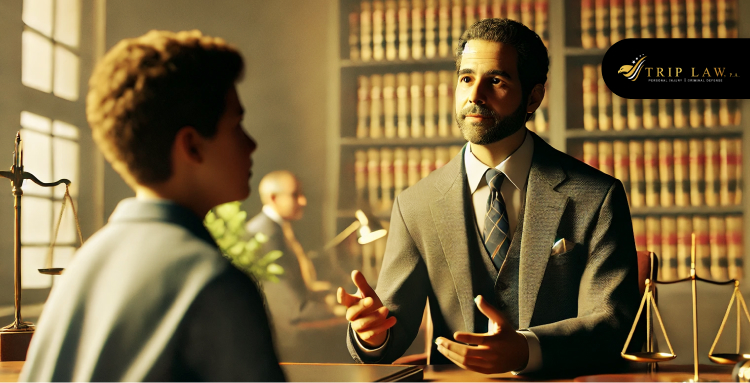
Claims Involving Minors: Wisconsin law considers minors (individuals under 18) legally disabled. They may need additional time to file a personal injury lawsuit. The statute of limitations for minors pauses until their 20th birthday or they become legally emancipated. From that point, they have 2 years to file their claim. However, this exception does not apply to medical malpractice cases, which have their own specific rules.
Mental Illness: For individuals who are mentally ill, Wisconsin law provides extra time to file a personal injury lawsuit. The statute of limitations clock pauses for people deemed mentally ill and unable to manage their affairs. Once their mental illness ends, they have 2 years to file their claim. However, this exception has a cap. The law limits extensions to 5 years (under §893.16 (1)), regardless of the mental illness's duration.
Government Entities: Filing a claim against the government is trickier and comes with shorter deadlines. You need to give formal notice within 120 days of the accident. If you miss this step, your claim could be denied entirely. You must act quickly when a government entity is involved.
What Happens If a Claim Is Filed Close to the Deadline?
If the injured party files their lawsuit just before the three-year deadline, but you receive the notice 3 years and 5 days later, the lawsuit might still be valid. The critical factor here is the date the lawsuit was filed with the court, not the date you were served with the notice. Here's how it works:
Filing Date: The statute of limitations requires filing the lawsuit within 3 years of the accident. As long as the injured party submits their paperwork to the court within this period, they have met the legal requirements.
Service of Process: After filing, the injured party must serve you with the lawsuit notice. This process can sometimes take a few days or even weeks. If you receive the notice 3 years and 5 days after the accident, it doesn't invalidate the lawsuit as long as the filing date was within the three-year limit.
This distinction is important because it ensures that, even with delays in the administrative process of serving the notice, the injured party preserves their right to seek compensation. Be prepared to respond to a lawsuit, even if you receive the notice slightly after the three-year mark.
Defense Strategies Against Late Personal Injury Claims

If you are sued after the three-year statute of limitations has passed, there are defense strategies your attorney can use to protect you. One of the most effective strategies is filing a motion to dismiss the case based on the statute of limitations.
Your attorney can argue that the lawsuit is too late and should be dismissed. Your attorney can point out that the plaintiff did not meet the required filing deadline, which is set by law.
Once a motion to dismiss is filed, the plaintiff bears the burden. They will need to provide evidence or arguments to support an exception to the statute of limitations. Such exceptions might include the discovery rule or the plaintiff being a minor or mentally ill at the time of the accident.
Most of the time, your first instinct might be to inform your insurance company immediately after an auto accident. As legal experts, we advise you not to inform your insurance when you don’t plan on using your coverage. There are valid reasons to consider not reporting the accident. If you're curious to learn more, check out this: Should You Report a Wisconsin Accident to Insurance Without Using Coverage?
Takeaway
In most cases, suing 3 years and 5 days after an accident is too late under Wisconsin law. Missing this deadline could mean losing your right to seek compensation, no matter the severity of your injuries or damages. Consulting a qualified attorney ensures your rights are protected and evaluates potential exceptions in your situation. If you've been involved in an accident, reach out to us for a free consultation and case evaluation.

November 28, 2024
How can I prove bodily damage in a slip and fall accident?
Slip-and-fall accidents happen in the blink of an eye, but their effects can linger long after the fall itself. Maybe you were walking on an icy Milwaukee sidewalk, passing through a store with a wet floor, or visiting someone’s home—suddenly, you’re on the ground, feeling the pain and shock set in. A fall like this can lead to serious injuries. If you’ve been hurt, proving the extent of your injuries is vital to getting the compensation you need for medical bills, lost income, and the ongoing care that might be required as you recover.
In Wisconsin, proving your injury claim requires solid evidence that connects your injuries to the accident and shows that the property owner’s carelessness played a role. Gathering this proof can feel daunting, especially when you’re already dealing with pain, frustration, and even the worry of missed work or mounting bills.
Let’s walk through the essential steps to build a solid case, protect your rights, and get the support you need during this challenging time.
(I) Seek Immediate Medical Attention: Why Urgent Care Matters
After a slip-and-fall, seeking medical care right away may feel like just another hassle, especially if the pain isn’t immediate or you’re unsure about the severity of your injury. But urgent medical attention is one of the most important things you can do—not only for your health but also for building a strong foundation for your injury claim.
Why Getting Care Right Away Matters
In the immediate aftermath of a fall, your adrenaline might be high, or you might be in shock, which can sometimes mask symptoms that show up later. A doctor can assess hidden injuries, such as internal bruising, sprains, fractures, or even concussions, that might not feel painful right away but could worsen over time. When you go to a doctor promptly, you’re taking an essential step to document your injury accurately and protect your health.
Steps to Take for Milwaukee Residents
In Milwaukee, you have several options for immediate care:
Visit a Local ER or Urgent Care: Milwaukee has a variety of emergency rooms and urgent care clinics, including Ascension St. Joseph, Froedtert Hospital, and Aurora St. Luke’s Medical Center. Going to the ER or urgent care begins your medical record. This is also essential if you decide to file a claim, as it directly connects your injuries to the accident without leaving room for doubt.
Follow-Up with Your Primary Care Physician: Even if you go to the ER first, following up with your regular doctor helps track any evolving symptoms and keeps a continuous record of your condition.
Don’t Skip on Specialist Visits or Physical Therapy: If you’re referred to a specialist, it’s important to attend all appointments and follow through with recommended treatment. Consistent treatment helps to clearly show the progression and seriousness of your injury, which strengthens your claim if you pursue one.
(II) Gather Key Medical Documentation: Build Your Case with Strong Evidence
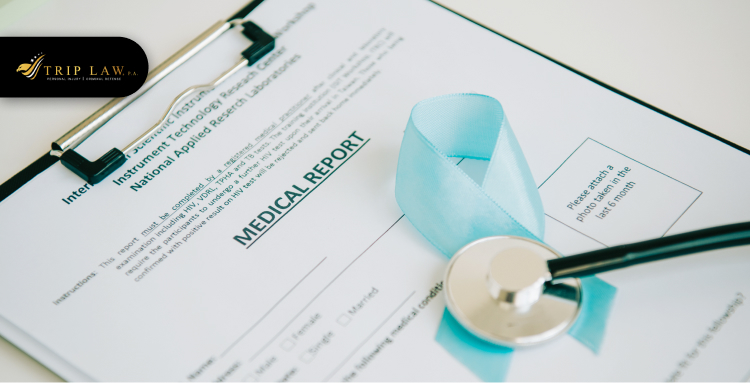
Once you’ve seen a doctor and started treatment, gathering complete and organized medical documentation is essential. Think of this documentation as the “story” of your injury—the details, images, and records that show what you’ve been through and just how deeply the accident has affected your life.
Diagnostic Tests: Visual Proof of Your Injuries
In the aftermath of a slip-and-fall, diagnostic tests like X-rays, MRIs, or CT scans provide concrete, visual proof of injuries that may not be obvious on the surface. These tests can reveal fractures, ligament tears, or other internal injuries that aren’t visible but can seriously impact your health and mobility.
If your doctor hasn’t already recommended it, don’t hesitate to ask about any additional testing that might clarify your condition. In some cases, specialists can not only provide a detailed diagnosis but also document more subtle injuries that could easily be overlooked without a trained eye.
Medical Reports and Prescriptions: Documenting the Ongoing Impact of Your Injury
Beyond initial exams and tests, maintaining a record of all treatment reports and prescriptions helps show how much care you need and the challenges you’re facing on the road to recovery. For instance:
Progress Notes from Physical Therapy: Physical therapy is often recommended for injuries following a fall. Progress notes from your therapist document your pain levels, physical limitations, and the work you’re putting in to regain strength or mobility.
Medication Records: Whether it’s pain management or anti-inflammatories, keeping track of prescribed medications shows the extent of your discomfort and the fact that your injury requires ongoing support.
(III) Capture Photographic and Video Evidence: Visual Proof of Your Experience
When you’re dealing with the pain and disruption of a slip-and-fall injury, taking photos and videos might not be the first thing on your mind. But visual evidence can be incredibly powerful when it comes to telling your story and making a compelling case for your claim.
➢Injury Documentation: A Visual Record of Bodily Harm
If you’ve sustained visible injuries—such as bruises, scrapes, or swelling—take photos as soon as possible to establish the seriousness of the injury from day one. Try to take clear, close-up shots of any visible injuries, as well as full-body photos that show the area of impact. Continue taking photos over the coming days and weeks to track changes, like bruises that deepen or swelling that worsens. This ongoing record can be especially helpful in cases where injuries evolve.
➢Scene Documentation in Milwaukee: The Importance of Capturing Hazardous Conditions
The scene of the fall is just as important as your injuries themselves. Hazardous conditions, such as icy sidewalks, poorly lit areas, or loose flooring, are often the root cause of slip-and-fall accidents. In Milwaukee, where winters can be especially harsh, documenting icy patches, unshoveled walkways, or slick entryways can be critical in showing how the property owner’s neglect led to your fall.
If possible, return to the accident scene as soon as you can (or have someone go on your behalf) to capture photos and videos of the area. Capture elements like poorly maintained steps, cracked pavement, or water pooling on slick tiles. Also, photograph any nearby warning signs (or lack thereof), as this is crucial information in premises liability cases.
(lV) How a Pain and Impact Journal Can Help Your Claim

Living with an injury can be overwhelming in ways that often don’t show up on X-rays or in test results. That’s why keeping a pain and impact journal can be so powerful—it’s a personal record that captures the day-to-day struggles, setbacks, and small victories of your recovery journey. This journal gives voice to the real, human side of your experience, documenting things that medical records might miss.
The Value of Personal Accounts: Bringing Your Story to Life
Your pain and impact journal is a way to share your story in your own words. Daily entries allow you to track how the injury impacts your everyday life. You might find that your pain varies day-to-day, or that certain activities become more challenging than they were before. These details are invaluable—they make it easier for others to understand just how much the injury has affected you physically, emotionally, and mentally.
How to Write an Effective Journal
To get the most out of your journal, try to write with as much detail as possible. Here are a few things to focus on:
Pain Levels: Rate your pain on a scale of 1-10 for different parts of the day, and note if certain activities worsen it. If pain medication helps or if pain levels increase, write that down. Address any mobility issues you face.
Emotional Struggles: Injuries often come with emotional challenges, from frustration, sadness, or anxiety about recovery. Write down how you’re feeling and how the injury affects your mood or interactions with others.
Limitations on Work or Family Life: If you’re unable to go to work or participate in family activities, note the specific limitations. Mention tasks you can no longer perform and responsibilities you’ve had to give up because of your injury.
Examples of Journal Entries
Here are a few sample entries to give you an idea of what to write:
Example 1: "8/3/24 - Woke up with sharp pain in my lower back. Pain was about a 7 out of 10 when trying to get out of bed. Tried to walk to the kitchen but couldn’t. Couldn’t play with the kids tonight, which was upsetting."
Example 2: "8/10/24 - Pain is still around a 6 most days, but spikes to an 8 if I walk more than a few steps. Getting in and out of the car is difficult. Called my boss to take more leave."
Example 3: "8/15/24 - Noticed some improvement today—the pain was at a 5 this morning. Managed to get through a short walk outside. Back pain came back to a 6 by evening."
(V) Witness Statements: How Others Can Support Your Claim
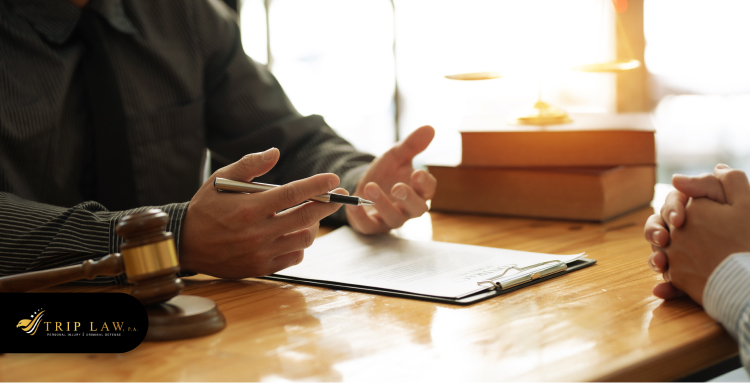
When it comes to slip-and-fall cases, eyewitnesses can play a vital role in supporting your claim. They can establish what happened during the accident, adding credibility to your version of events. But it’s not just about what happened on that day; testimonies from family and friends can provide invaluable insight into how your injury has altered your day-to-day life.
➢Eyewitnesses in Slip-and-Fall Cases: Strengthening Your Story
If there were any observers present during your accident—whether they were passing by, shopping in the same store, or waiting for a bus—they can offer crucial evidence that backs up your account. Their statements can confirm details like the conditions of the area where you fell, whether any warnings were posted, or if the property owner was aware of the hazards.
When gathering witness statements, ask those who saw the incident to share their observations as soon as possible about the people who were around at the time—store employees, fellow shoppers, or passersby and talk to them for statements. Encourage them to write down what they remember while the details are still fresh. Specifics matter—details about the environment, the weather conditions, or how you fell can all paint a clearer picture of the incident.
➢Statements from Family and Friends: The Human Impact of Your Injury
Encourage loved ones to share their observations in a written statement or even to be available for testimony if needed. They can speak to changes in your ability to participate in family activities, and how you need additional support since your accident.
(VI) Utilize Expert Testimony When Necessary
Dealing with the aftermath of a slip-and-fall injury can be tough, and sometimes, you can’t rely solely on your own experience to build a solid case. That’s where expert testimony comes in handy. Bringing in professionals can provide specialized insights to strengthen your claim.
Medical Experts: Shedding Light on Your Injury’s Impact
When it comes to understanding your injuries, medical experts—like doctors, specialists, or physical therapists—can provide critical insights. They can testify about the nature of your injuries, how they were caused, and discuss the extent of your physical limitations. This expert testimony is particularly valuable in court or during negotiations with insurance companies.
For instance, a doctor might clarify how a slip on an icy surface led to a specific injury, such as a fracture or soft tissue damage, and detail the expected recovery process.
Vocational Experts: Evaluating Employment Impact
These professionals specialize in assessing how injuries affect a person’s ability to work and can evaluate lost earnings or future earning potential. They can provide insights into How the injury may limit your ability to perform your previous job duties and harm your earning capability.
(VII) Establishing Liability in Wisconsin: What You Need to Prove for Your Claim

In Wisconsin, property owners have a responsibility to keep their premises safe for visitors, which falls under what’s known as premises liability law. This means they must take reasonable steps to ensure that hazards, like icy sidewalks or crumbling stairways, are addressed promptly.
The Duty of Care
In Milwaukee, property owners must provide a safe environment for their guests and anyone else who might be on their property. Whether it's a commercial space like a store or a private residence, the property owner is responsible for knowing about dangers and fixing them or at least warning visitors about them. If you slip and fall due to unsafe conditions, demonstrating that the property owner failed to uphold their duty can be key in establishing liability for your injuries.
Evidence of Negligence: Proving Unsafe Conditions
To hold a property owner accountable, you’ll need to present evidence that unsafe conditions existed at the time of your fall. This could include:
Icy Sidewalks: If you slipped on ice that hadn’t been cleared or salted, showing that the owner failed to take care of it is essential.
Neglected Maintenance: Any visible signs of disrepair, like cracked pavement or loose floorboards, can support your claim that the property owner neglected their duty.
Absence of Warnings: If there were no warning signs indicating the hazard, this can demonstrate negligence as well.
Comparative Fault in Wisconsin: Understanding Shared Responsibility
It’s also important to be aware of Wisconsin’s modified comparative fault rule, which can come into play in slip-and-fall cases. This rule means that if multiple parties share responsibility for an accident, the compensation you can receive may be affected based on the degree of fault assigned to each party. For example, if it’s determined that you were 20% at fault for the accident—perhaps because you were distracted—your compensation may be reduced accordingly.
(VIII) Contact Milwaukee Legal Pro To Win Your Slip and Fall Case
A knowledgeable Wisconsin personal injury lawyer can be your advocate in identifying and connecting you with reliable experts in both medical and vocational fields. They often have established relationships with trusted professionals who can provide accurate assessments and compelling testimony.
Our attorney can guide you in preparing for expert consultations and ensure that the testimony is effectively integrated into your overall case strategy. We can negotiate with the insurance company for a fair settlement for your damages. By utilizing expert witnesses, and proper documentation of your injury, you enhance the credibility of your claim.

November 28, 2024
What to Do if You’re Hit by an Uninsured Driver at Fault in Wisconsin
Getting into a car accident is stressful enough, but it can be even more frustrating when the other driver turns out to be uninsured. In Wisconsin, where all drivers are required to carry uninsured motorist coverage, you may wonder what steps to take next if you find yourself in this situation.
Fortunately, you have options to pursue compensation for your injuries and damages. Today we’re going to discuss the essential actions you should take immediately after an accident with an uninsured driver, how your insurance can help, and the legal options available to ensure you receive the support you need during this challenging time.
(1) What should you do immediately after the accident?
After an accident, it’s completely understandable to feel overwhelmed. The physical and emotional distress can turn your world upside down, leaving you feeling lost and uncertain. In these challenging moments, it’s important to remember that taking certain steps can help ensure your safety, provide legal protection, and facilitate proper documentation.
You’re not alone in this; many have faced similar situations, and there are ways to navigate the aftermath with care and support. Here’s what you should do:
Calling the police: First, you need to inform your local authority. You must report the accident to local law enforcement if there is any personal injury or death. You can also report to the police in case of property damage if there is property damage valued at $1,000 or more, or at least $200 in damage to government-owned property other than a vehicle according to Wisconsin Statutes 346.70. The police will document the incident and file a report.
Document the scene: Gathering important information can be a crucial step toward ensuring your well-being and protecting your rights. If you’re able, try to collect the names, addresses, driver’s license numbers, vehicle registration details, and insurance information from everyone involved. Taking photographs of the accident scene, any damage to vehicles, and relevant road conditions can also be helpful. Additionally, if there are witnesses present, gathering their statements can provide valuable support for your case.
Seeking medical attention: If you’re in an accident, prioritize your safety. Assess yourself and others involved for injuries. If anyone is injured, call 911 for medical assistance. Moreover, you need to keep your medical bills and documents of your injuries.
Not accepting liability: When an uninsured driver is at fault, they may deny responsibility and attempt to shift the blame onto you. In any situation, avoid saying anything that could suggest you are fully or partially at fault.
(2) How Do You Identify an Uninsured Driver?

In Wisconsin, the driver at fault for an accident is typically responsible for the damages. It’s important to know that all drivers in the state must carry auto insurance. If you find yourself in the unfortunate situation of being involved in an accident with an uninsured driver, understanding their insurance status can be crucial.
This knowledge allows you to file a claim under your uninsured motorist coverage, which is a necessary component of all Wisconsin auto insurance policies. This coverage can provide important financial support for medical bills, property damage, and other losses you may have experienced due to the accident.
Here’s what you need to consider to spot an uninsured driver:
An uninsured driver does not have valid auto insurance for their vehicle. If you are involved in an accident and the other driver cannot provide proof of insurance, they may be uninsured.
A driver may also be termed uninsured if their liability insurance is insufficient to fulfill Wisconsin's minimal coverage standards.
If a driver acts strangely for instance he flees the scene of an accident without providing their information, they are effectively acting as an uninsured driver.
(3) How Should You Notify Your Insurance Company?
Wisconsin's Safety Responsibility (SR) Law protects you after a car crash and provides an incentive for damages. Furthermore, it keeps the guilty party accountable by restricting their car registration and license if the at-fault party refuses to pay. Notifying your insurance carrier after an accident is an important step in ensuring that you get the coverage you require.
When you reach out to your insurer, try to provide essential details like the date, time, and location of the accident, along with the names and contact information of everyone involved and a brief description of what happened. Remember, you’re taking an important step toward getting the financial support you need as you walk through this challenging experience.
Note: Don’t confess liability about the accident to the insurance company until you've spoken with an attorney. It is important to limit your conversation to factual information.
How does Uninsured Motorist (UM) Coverage help you in Wisconsin?
In Wisconsin, uninsured motorist coverage is mandatory for all auto insurance policies.UM coverage can help pay for medical bills resulting from an accident caused by an uninsured driver. If injuries from the accident prevent you from working, UM coverage may compensate for lost income. This coverage can also provide compensation for pain and suffering associated with injuries sustained in an accident
Are There Other Insurance Coverages That Could Help?
Underinsured Motorist (UIM) coverage: This is optional but strongly recommended. It covers you when the at-fault motorist carries insurance but the policy limits are insufficient to pay your losses. Minimum limits for UIM are usually $50,000 per person and $100,000 per accident.
Medical Payments Coverage (MedPay): This optional coverage helps pay for medical expenses for you and your passengers in the car.
(4) What Are Your Coverage Options and Limitations?

Understanding your coverage choices, especially Uninsured Motorist (UM) coverage in Wisconsin, is important for ensuring you are sufficiently protected in the case of an accident. Here's a breakdown of your coverage options, restrictions, and potential difficulties in receiving compensation.
➢ Understanding how Uninsured Motorist (UM) Coverage Works in Wisconsin
In Wisconsin, UM coverage is required for all auto insurance policies. The minimum coverage limits are $25,000 per person for bodily injury and $50,000 per accident for total bodily injury. UM coverage applies when you are involved in an accident with an uninsured driver or a hit-and-run situation. It can cover medical expenses, lost income, and pain and suffering.
➢ Challenges You May Face in Getting Compensation
You can better prepare yourself to handle incidents involving uninsured or underinsured drivers in Wisconsin effectively if you know the potential challenges:
Proving liability: It can be difficult, especially if the other driver denies responsibility or there are no witnesses.
Improper documentation: A lack of sufficient paperwork (such as police reports or medical records) might make it difficult to establish the validity of your claim.
Insurance Company Delays: These types of claims require significant documentation, extending the payout process.
Dispute Over Coverage Limits: If the at-fault motorist has low or no insurance, finding the appropriate compensation might be challenging.
(5) How do Milwaukee Legal Pros help you with legal action?
Do not hesitate to get in touch with us if you live in Milwaukee or the state of Wisconsin and would like guidance on how to manage an accident with an uninsured or underinsured driver. Even if you were in an accident and you are not sure if it was properly reported to the police, you can contact us. Here’s how we can help you:
Milwaukee attorneys are well-versed in Wisconsin state laws and regulations, ensuring that your case is handled according to local legal standards.
We can help to gather evidence, negotiate with insurance companies, and represent you in court if necessary.
You will get assistance in filing claims for personal injuries sustained due to accidents or negligence
If your case involves an appeal, our legal professionals can navigate the appeals process, represent you before administrative law judges, and help you ensure the compensation you’re entitled to.

November 27, 2024
How Can I Find a Reputable Accident Injury Attorney for My Personal Injury Case?
When you’re facing a personal injury case, choosing the right accident attorney is essential—it can shape how effectively your case is handled and the quality of your legal representation. Gathering evidence, keeping records organized, and negotiating with insurance companies is hard enough, but when you’re dealing with an injury, it’s nearly impossible to manage on your own. That’s where an experienced attorney can be a game-changer, giving you critical support and legal expertise while you focus on recovery.
However, finding a top-notch accident attorney isn’t always straightforward. But with a few smart strategies, you can connect with the right professional to help secure the compensation you truly deserve. So, where do you start when you’re looking for an attorney to help you navigate these legal hurdles?
1) Understating the legal requirements
There are different types of personal injury cases. To manage any of the injury cases, you must provide solid evidence, ensuring clear legal arguments. So, you have to hire an attorney based on your legal requirements.
Knowing the type of your case
Since no two personal injury cases are exactly alike, it's essential to pinpoint which category your case fits into. For example, vehicle accidents cover incidents involving cars, trucks, motorcycles, and more. If you’ve been hit by an uninsured driver, seeking an attorney with expertise in vehicle accident cases is a smart move.
Likewise, injuries resulting from employer negligence fall under the workplace injury category. And if you’ve had a slip-and-fall incident, that’s typically handled under premises liability. Knowing where your case falls can help you connect with the right legal professional for your unique situation.
Severity of injuries
Every year, around 40 million people in the U.S. suffer serious personal injuries that lead them straight to the emergency room. The severity of these injuries can directly impact the case—and the potential compensation. Attorneys with a background in high-stakes cases are skilled at handling those that involve long-term medical care for severe injuries.
When the injury is especially serious, they’ll advocate with the court for higher compensation. So, before choosing an attorney, consider the extent of the injury, as it plays a major role in the type of legal representation you’ll need.
2) Steps to find a reputable accident injury attorney

To find a reputable accident injury attorney, you should follow some sequential steps and strategies with thorough research.
Seeking referrals
Start by reaching out to family, friends, or colleagues to see if they can recommend an attorney they trust for similar legal needs. Personal referrals are often invaluable because they come from people who’ve experienced firsthand what it’s like to work with that attorney. They can give you insight into the attorney’s approach, dedication, and success rate—details you might not find online.
Plus, a recommendation from someone you trust adds peace of mind, especially when you’re facing something as serious as a personal injury case. So don’t hesitate to tap into your network; it might lead you to a reputable advocate who truly has your back.
Researching attorney backgrounds and creating a shortlist
Next, search for attorneys who offer services in your local area. It's important to find someone who understands the specific laws and regulations that apply to your jurisdiction. A great way to verify an attorney's credentials is by checking an attorney directory, as reputable lawyers are often members of bar associations and other respected legal organizations.
These affiliations not only highlight their commitment to ethical standards but also indicate their expertise in their practice areas. This step can help you narrow down your options and ensure you’re considering attorneys who are well-regarded within the legal community.
Verifying credentials
Once you have shortlisted potential attorneys, check their credentials. Confirm that your shortlisted attorneys have a legitimate license to practice in your state. And check whether they have certifications or specializations in personal injury law by looking at their websites.
Scheduling consultation with prospective attorneys
Many personal injury attorneys offer a free initial consultation to discuss your case, and this is a fantastic opportunity you shouldn’t pass up. Take the chance to meet with several attorneys, allowing you to gauge their approach and expertise.
During this confidential session, feel free to ask questions about their experience with cases like yours, their strategy for handling your situation, and their overall philosophy on client representation. This dialogue not only helps you assess their interest in your case but also gives you a sense of whether their communication style aligns with your needs.
Evaluating communication level and availability
During the consultation, pay close attention to how well the attorney listens to your concerns and explains their approach to handling your case. It's crucial to choose someone who is not only responsive but also easily accessible when you have questions or need updates. A good attorney will ensure you feel heard and understood, taking the time to clarify any legal jargon and provide insights into the steps they'll take.
Look for someone who is committed to keeping you informed about your case's progress, as this communication is key to a successful attorney-client relationship. After all, you want an advocate who will stand by you every step of the way and make you feel confident in their representation.
3) Qualities to look for in a personal injury attorney

Select an attorney by observing some specific qualities in them. These can reveal their competence and dedication to the clients.
Specialization in personal injury cases similar to yours
Attorneys who regularly handle cases similar to yours can ensure a thorough understanding of applicable statutes and potential legal hurdles. Such specialized knowledge and proficiency are important in advocating for a positive judgment.
Strong record of winning personal injury cases
By assessing an attorney's track record, one can obtain pertinent information regarding their proficiency in securing favorable outcomes in multiple cases. However, it is advisable to inquire regarding the particular settlements obtained for individuals with analogous cases.
Client-focussed approach and dedication
An esteemed legal professional believes in a client-centric approach. So, it is essential to seek legal representation that consistently prioritizes your needs and interests.
4) Key questions to ask during the initial consultation
During the initial consultation with the attorneys, ask them certain questions. This will let you know supplementary matters that you can not comprehend using independent research.
Discussing possible challenges in your case
Every case comes with particular challenges. Ask the attorneys about the potential obstacles they foresee in your case. And try to know what would be their plan to address those challenges.
This involves steps they will take for investigation, gathering evidence, and negotiating on behalf of you. As a consequence, you can start collecting the documents that your attorney may need later.
Understanding payment structures and fees
Most personal injury lawyers in Wisconsin work on a contingency fee basis. So, you have to ask the attorneys about their payment structure, whether it’s hourly or contingency-based. You can also ask them if they will charge any additional fee later or not. After consulting with multiple attorneys, compare their fees and payment structures to each other.
Determining comfort level in handling your case
It's important to feel comfortable with your attorney and their way of approach. You need to ask how often they will update you and whether they will respond to your queries throughout the case.
5) Things not to do when choosing an attorney
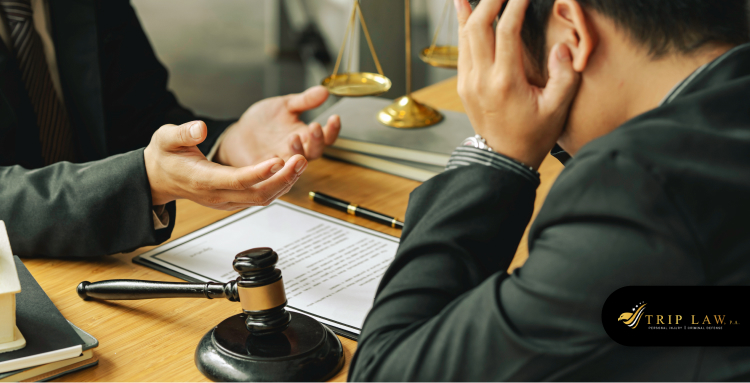
There are some common mistakes that many people make while choosing a personal injury attorney. Avoid making those mistakes to hire an attorney who can help you get the best possible outcome for your case.
Hiring based on advertisement
Advertisements can be flashy, but they often fall short of giving you a complete picture of an attorney’s true capabilities and areas of specialization. Instead of solely relying on the claims made in a law firm’s marketing materials, it’s crucial to base your decision on thorough research and personal consultations. Take the time to evaluate each attorney’s background, expertise, and case history. After all, your case deserves more than just a catchy ad; it needs a dedicated advocate with the right experience.
Not checking client reviews and references
Be sure to conduct a thorough check of client reviews and testimonials to gauge the attorney's reliability and track record of success. These firsthand accounts can provide valuable insights into how previous clients felt about their experience, the attorney’s communication style, and their overall effectiveness in handling cases.
Look for patterns in the feedback—positive remarks about responsiveness and successful outcomes can be strong indicators of an attorney’s capability. Conversely, any recurring negative comments might raise red flags. Taking the time to read these reviews will help you make a more informed decision and ensure you choose an attorney who has a solid reputation for delivering results.
Ignoring specialization and selecting based on cost
It is important to look for an attorney with specialized knowledge in this specific area of law. A general practice lawyer may not be positioned to achieve the optimum result in your case. Furthermore, compromising on the cost while selecting the attorney may not yield any beneficial outcomes. Because the lowest fees offered do not necessarily guarantee quality representation.
Selecting the first attorney you meet
Never rush into a decision to hire an attorney based solely on your first consultation. It’s wise to schedule meetings with multiple attorneys from your shortlist. This strategy not only gives you a broader perspective on different legal approaches and styles but also allows you to compare their responses to your concerns. Each consultation can reveal varying insights into how they would handle your case, helping you gauge their expertise and compatibility with your needs.
6) Milwaukee Legal Pros: the right choice for your case?
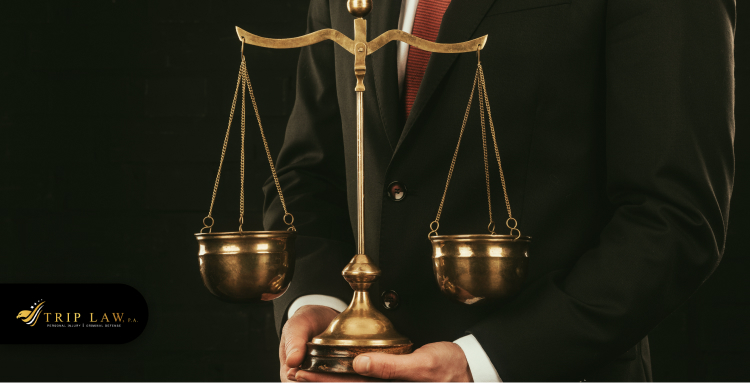
Our team of experienced attorneys provides services on different categories of personal injury cases. If you are currently living in Wisconsin, you can take services from us. We help our clients to handle their personal injury cases in the following ways:
Ensuring proper evidence:
We’re here to take the burden off your shoulders by meticulously collecting all the necessary evidence to strengthen your case. This includes vital documents like police reports, which provide an official account of the incident, detailing how it occurred and the parties involved. We’ll also gather medical records that outline the extent of your injuries, treatments received, and any ongoing care needed—crucial for demonstrating the impact of the accident on your life.
In addition, we’ll reach out to witnesses to obtain their statements, capturing their firsthand accounts of the event. These testimonies can be powerful in corroborating your version of events and establishing liability.
Proving liability and negligence:
Our attorneys possess the expertise needed to demonstrate that the negligence of the other party was the direct cause of your accident. We’ll meticulously investigate every aspect of the case, gathering evidence that clearly establishes how their actions—or lack thereof—led to your injuries.
This may involve analyzing police reports, examining traffic camera footage, and consulting with experts who can provide insights into the standard of care expected in similar situations. For example, if you were involved in a car accident due to another driver’s reckless behavior—like speeding or ignoring traffic signals—we’ll present compelling evidence to illustrate their failure to adhere to safe driving practices.
Meeting legal deadlines:
In Wisconsin, the clock starts ticking the moment you become aware of your injury, and you typically have a limited timeframe—usually three years for personal injury cases—to file a claim. We understand how overwhelming this process can be, especially when you’re dealing with the aftermath of an accident. That’s why our dedicated team meticulously tracks all relevant deadlines, ensuring that every necessary document is prepared and submitted on time.
Negotiating with the insurance company:
We’re fierce advocates for our clients, tirelessly negotiating with insurance companies to secure the compensation you rightfully deserve. Insurance adjusters often try to minimize payouts or downplay the impact of your injuries, but our team is here to stand firm on your behalf. We understand the tactics they use, and we’re equipped with the knowledge and experience to counter them effectively.
From gathering compelling evidence to presenting a strong case, we work diligently to demonstrate the full extent of your damages—be it medical expenses, lost wages, or emotional suffering. We know how crucial it is to build a robust claim that reflects the true impact of your accident on your life.
Prioritizing client satisfaction:
From the moment you engage our services, we’ll outline what you can expect in terms of milestones and timelines. Whether it’s receiving medical records, negotiating with insurance adjusters, or preparing for court appearances, you’ll be in the loop about every development. We don’t just send generic emails; we take the time to explain what each update means for your case and the next steps we’ll be taking together.

November 27, 2024
Should You Report a Wisconsin Accident to Insurance Without Using Coverage?
In the hustle and bustle of our modern life, accidents can happen without warning. When you face an unfortunate vehicle incident, the first instinctive response that comes to mind – reporting it immediately to the insurance company. However, there are some circumstances where it may be prudent to reconsider this act. Especially when you do not intend to file a claim or are not planning to use coverage. It’s also crucial to be vigilant when dealing with your insurance company. Because your one improper statement or acknowledging fault can jeopardize your claim.
As a personal injury lawyer, I advise you not to tell your insurance company after an accident when you do not intend to use coverage. But why should you not inform the insurer or what are those circumstances? Let’s discuss the benefits of not informing your insurance company after a casualty.
6 Reasons To Avoid Informing Your Insurance Company After An Accident
Wisconsin law generally requires drivers to report accidents involving significant injury or property damage. But there are situations where notifying your insurance company may not be necessary. If you do not plan on using your coverage, it might be in your best interest to avoid contacting your insurer. Here are eight reasons why:
Minor accidents sometimes lead to higher rates
If you have minor, non-injury accidents, reporting them to your insurer can result in increased premiums. Wisconsin law permits insurers to adjust premiums based on risk factors. Insurers often view any accident as a risk factor. Regardless of fault, a single report can be seen as an indicator of higher risk. This can lead to higher rates upon policy renewal.
Out-of-pocket repairs instead of making a claim
If the damage from your accident is minor, it may be less expensive to handle repairs yourself than to involve your insurance company. Wisconsin insurers often apply deductibles and consider any claims when calculating future premiums. If the damage is well below your deductible, it better pay for repairs out-of-pocket. This can help you avoid triggering a claim that may raise your rates in the future.
Easy to handle than hassle with insurer
Filing an insurance claim can be a lengthy and frustrating process. You may be required to provide extensive documentation, undergo inspections, and face potential disputes over coverage or fault. Since you’re not planning to use coverage, it can be easier to handle on your own instead of hassling with your insurance company.
No visible damage is not worth reporting
In some accidents, there may be no visible damage. If the damage does not exceed $1,000, reporting might not be required. If the accident did not cause any noticeable harm and neither party wishes to make a claim, reporting it could impact your claim history. For example, labeling as a higher-risk driver and increment in premiums.
No fault or involvement of other
If there is no other party or property involved, it’s better not to report it to the insurance company. For instance, you had an accident with a stationary object, and it’s a low-impact collision. Wisconsin follows a "comparative negligence" or “shared fault” standard. So reporting means you have used your coverage where you did not intend to do it. If you are certain the accident is minor and can be resolved privately, it may be better to avoid formal reporting.
Deductible may exceed damage
Most auto insurance policies in Wisconsin come with deductibles that range from $250 to $1,000 or more. Though it varies from company to company. If the cost to repair your vehicle is less than your deductible, there won’t be much benefit in filing a claim.
Suppose you have a $500 deductible but the damage to your vehicle is only $300. In this case, paying out-of-pocket would make more sense. Because the repair costs are less than your deductible. Filing a claim wouldn’t help financially and could still increase your future premiums.
Risk of Non-Renewal of Policy
Under Wisconsin law, insurance companies can decide not to renew a policy if they consider you a high-risk driver. Filing multiple claims, even for small accidents, may signal to the insurer that you are more likely to cost them money in the future. If your policy is non-renewed, finding affordable coverage elsewhere may become more difficult.
When Report Is Necessary Even If You Don't Plan to Use Coverage
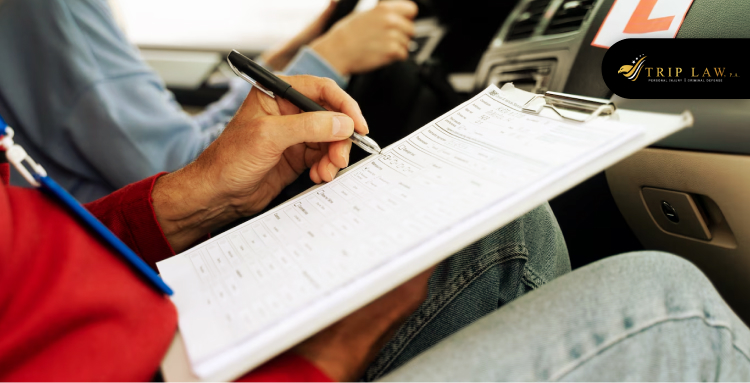
Above are the situations where you might not need to report to your insurance company; especially when you don't want to use coverage. There are also some circumstances where reporting is essential. Wisconsin law establishes specific requirements for reporting accidents. If you fail to notify your insurer you might face potential legal consequences.
State law reporting requirements
In Wisconsin, you are legally obligated to report any accident that results in injury, death, or property damage exceeding $1,000. This includes both accidents involving your vehicle and those involving other parties. Failing to report an accident that meets these criteria could result in penalties or fines.
Potential future claims
Even if you do not plan to file a claim immediately, circumstances may change. If you later discover that injuries or damages are more severe than initially assessed, you might want to file a claim. Reporting the accident ensures that you have documentation on record should you need to pursue a claim in the future.
Other driver’s insurance
If the other driver is at fault and you plan to pursue a claim against their insurance, your own insurer may need to be involved in the process. They can help facilitate communication. Also, ensure you have the necessary information for filing a claim with the other party's insurance company. Not reporting the accident could complicate this process.
Unseen damage
Sometimes, damage from an accident may not be immediately visible. Structural issues or mechanical problems can surface later, potentially resulting in costly repairs. Reporting the accident allows your insurer to document the incident. It can be crucial if you need to make a claim for any hidden damage later on.
Policy requirement
Many insurance policies contain clauses requiring policyholders to report any accidents, regardless of whether a claim is filed. Not adhering to this requirement could lead to complications with your coverage or even denial of claims in the future. It’s essential to review your policy to understand your obligations.
Protect from a fraudulent claim
Reporting an accident can serve as protection against potential fraudulent claims. If the other party attempts to claim damages or injuries that you believe are unfounded, report it to your insurer. Having your report on file can provide a defense against their allegations. This is particularly important in contested cases where liability may be disputed.
Legal liability
If you were at fault in the accident, failing to report it to your insurer may expose you to legal liability. This is especially pertinent if the other driver decides to pursue legal action against you for damages or injuries. Notifying your insurance company ensures you are protected and that they can provide the necessary legal support.
Prevent future rate increment
Reporting the accident may mitigate potential future rate increases. Insurers consider your overall claims history when determining premiums. By promptly reporting an accident, you may show responsibility. This can potentially reduce the impact on your future premiums compared to if the incident is discovered later.
How Milwaukee Legal Pros Can Help

What you should do after an accident can be overwhelming. It is quite true when dealing with insurance companies. Partnering with an experienced personal injury attorney can make a significant difference. Personal injury Attorneys from Milwaukee Legal Pros specialize in accident claims. Understand how insurers operate and know how to protect clients from unfair practices. We will-
Conduct a thorough investigation of your accident and gather crucial evidence.
Assess the full scope of your losses, including future medical care and ongoing costs.
Identify the at-fault and liable parties, ensuring the proper individuals or entities are held responsible.
Review the terms of the insurance policies involved to determine available coverage.
Establish negligence by proving how the responsible party's actions caused the accident.
Negotiate aggressively with the insurance company to secure a fair settlement.
File your claim and handle the entire claims process.
Take your case to court if a lawsuit becomes necessary, advocating for your rights every step of the way.
We offer free case reviews, allowing you to discuss your legal options without any upfront commitment. Insurance companies prioritize their profits, often at the expense of accident victims. But we will make sure you get your compensation properly and fairly. Reach out to Milwaukee Legal Pros today.
At Trip Law we set out to create a unique law firm where outstanding immigration representation and a deep commitment to humanity go hand in hand. Hardam H. Tripathi was a former legal professional in the federal government.
